Latest
2024
Jul
Jun
May
Apr
Mar
Feb
Jan
2023
Dec
Nov
Oct
Sep
Aug
Jul
Jun
May
Apr
Mar
Feb
Jan
2022
Dec
Nov
Oct
Sep
Aug
Jul
Jun
May
Apr
Mar
Feb
Jan
2021
Dec
Nov
Oct
Sep
Aug
Jul
Jun
May
Apr
Mar
Feb
Jan
2020
Dec
Nov
Oct
Sep
Aug
Jul
Jun
May
Apr
Mar
Feb
Jan
2019
Dec
Nov
Oct
Sep
Aug
Jul
Jun
May
Apr
Mar
Feb
Jan
2018
Dec
Nov
Oct
Sep
Aug
Jul
Jun
May
Apr
Mar
Feb
Jan
2017
Dec
Nov
Oct
Sep
Aug
Jul
Jun
May
Apr
Mar
Feb
Jan
2016
Dec
Nov
Oct
Sep
Aug
Jul
Jun
May
Apr
Mar
Feb
Jan
2015
Dec
Nov
Oct
Sep
Aug
Jul
Jun
May
Apr
Mar
Feb
Jan
2014
Dec
Nov
Oct
Sep
Aug
Jul
Jun
May
Apr
Mar
Feb
Jan
2013
Dec
Nov
Oct
Sep
Aug
Jul
Jun
May
Apr
Mar
Feb
Jan
2012
Dec
Nov
Oct
Sep
Aug
Jul
Jun
May
Apr
Mar
Feb
Jan
2011
Dec
Nov
Oct
Sep
Aug
Jul
Jun
May
Apr
Mar
Feb
Jan
2010
Dec
Nov
Oct
Sep
Aug
Jul
Jun
May
Apr
Mar
Feb
Jan
2009
Dec
Nov
Oct
Sep
Aug
Jul
Jun
May
Apr
Mar
Feb
Jan
2008
Dec
Nov
Oct
Sep
Aug
Jul
Jun
May
Apr
Mar
Feb
Jan
2007
Dec
Nov
Oct
Sep
Aug
Jul
Jun
May
Apr
Mar
Feb
Jan
2006
Dec
Nov
Oct
Sep
Aug
Jul
Jun
May
Apr
Mar
Feb
Jan
2005
Dec
Nov
Oct
Sep
Aug
Jul
Jun
May
Apr
Mar
Feb
Jan
2004
Dec
Nov
Oct
Sep
Aug
Jul
Jun
May
Apr
Mar
Feb
Jan
2003
Dec
Nov
Oct
Sep
Aug
Jul
Jun
May
Apr
Mar
Feb
Jan
2002
Dec
Nov
Oct
Sep
Aug
Jul
Jun
May
Apr
Mar
Feb
Jan
2001
Dec
Oct
Sep
Aug
Jul
Jun
May
Apr
Mar
Feb
Tuesday, January 30, 2024
Daily Log
I'm having something of a breakdown today. Follows yesterday, when I had to go to the dentist (routine cleaning), after which I went shopping at Home Depot and Dillons (groceries), then picked up Chinese at Great Wall. After which I finished a rather depressed Music Week, following a long Speaking of Which on Sunday. We went for a short walk this afternoon, during which I found myself leaning against a wall, my face buried in my arms, trying to control my breathing.
Lots of stress-inducing things going on right now. Since returning from the walk, I've spent the last hour trying to debug the problem of no audio on this computer (mingus). Speakers are plugged in, with power. Pulseaudio Volume Control shows Built-in Audio Analog Stereo; Port: Line Out (plugged in); alternative: Headphones (unplugged). When I plug headphones into the computer front port, they are recognized and take precedence. When I plug headphones into the speaker, I get no effect. All volume meters are set to medium levels.
Pulseaudio tool has two configurations:
- Oland/Hainan/Cape Verde/Pitcairn HDMI Audio [Radeon HD 7000 Series]: off
- Built-in Audio: Analog Stereo Output
If I wanted to use the speakers in the HDMI monitor, I would presumably use the former, but as far as I know, I've never done that, because I've always had speakers directly attached to the green motherbord port.
The speakers stopped working about a month ago. They have a blue light when in use -- it comes on automatically after a couple seconds, and turns off 15-30 seconds after the line drops, but if I turn the Volume knob all the way down, the light comes on, and stays on until the timeout. I do occasionally hear clicks when I plug in or jostle the cable.
I get a "System program problem detected" pop-up on reboot, which asks me "Do you want to report the problem now?" but doesn't offer me any details on what the problem was.
Looking at /var/log/apport* and /var/crash suggests occasional problems with cupsd, but nothing to do with audio. Older logs show problems with vlc, gimp, and gdbus, but not many.
I installed gnome-logs (using snap), but it isn't very helpful. Nor am I at all enlightened by the state of online troubleshooting info on audio. It does appear that pulseaudio is the driver, which is accessed by the Volume Control and Sound apps under Settings. A ps shows pulseaudio running:
/usr/bin/pulseaudio --daemonize=no --log-target=journal
OK: After typing all of the above, I finally found the idiot icon under Output Devices that muted the Built-in Audio Analog Stereo device, causing all of my trouble. Click on the icon, which then vanishes, and the speaker starts working (after the usual delay, and volume adjustment).
That then finally allowed me to play the stupid YouTube video about setting up my new CPAP machine. I got the machine over a week ago, but only set it up on Sunday. I've used it two nights so far, and I have, well, questions. I figured I should check out the provider's setup site before I try contacting them, which let me to the YouTube video, which sent me down the rabbit hole. But let's continue working through my angst. (I mean, so far, so good, right?)
On the new CPAP machine, most of the details are in the letter I wrote:
You shipped me a new CPAP machine. Delivery ticket is dated 1/8/2024, sales order 3864329, ID 227245. The machine is NN-Luna G3 APAP./CPAP/Autopap Device, React Health (3B)/NNLG3600, Serial No. A3123307153.
I got the machine a week ago, but only set it up on Sunday, after reading all of the documentation that came with it. I was disappointed to find it incompatible with the filters and tubing I already had.
The most puzzling issue is that while I noticed the slot for a SD card, I didn't find any SD card in the package, nor was one listed on the Deliver Ticket. It seemed unlikely that I was supposed to reuse the SD card from my previous ResMed AirSense 10 machine, so I tried turning it on, and was surprised to find that it didn't demand a card be inserted (as the ResMed would have). I've long had to remove the SD card from the old machine and bring it into the doctor's office so they could certify compliance and evaluate the machine's effectiveness.
As I understand it, some of the machine's parameters (at least for the ResMed) were programmed into the SD card (e.g., the pressure prescriptions). So my first question is what about the SD card?
The machine does appear to work without it. Two problems are evident so far:
The time is set 2 hours ahead of here (Wichita, KS, so CST/CDT). I saw settings for date and time format, but nothing for timezone or to actually set the clock. The time itself is so small and hard to see that it's useless for telling time, but it really messes up my sleep reports. I rarely go to sleep before 4AM, so I often sleep until after 11AM, or sometimes (if I'm lucky) noon. However, the machine starts calculating a new day at noon (its time, so 10AM here). Consequently, the sleep reports only show the last hour or two of a full night's sleep, so I'm greeted with really mediocre scores. There should be a better way to do this -- noon is way too early for a division line (even the worst early birds I know wait until 7:30 or 8:00PM before going to bed; on the other hand, when I was working 3rd shift, I often slept until 4-6 PM. But it would probably suffice if we could just shift the timezone from Newfoundland to here, or better still to Pacific).
The mode setting is AutoCPAP. The machine does turn on when I breathe into the mask (as the ResMed did), but it does not turn off when I disconnect the hose (the manual mentions an Auto Off feature, but it's not working). Consequently, when I disconnect the hose, it registers as a mask leak, and those figures shoot off the charts, burying any actual leak data. (When I did Mask Check, it responded: "Great!")
I need to go back and reread the manual, to see if there is anything else. I recall seeing a WiFi icon, but it didn't seem to lead anywhere. (We have WiFi, but it requires authentication, so the machine obviously isn't using it.) I've seen QR codes, and have no idea what they're good for (here or anywhere else -- I'm afraid I've developed a major mental block against them). I recall brief mention of an app, but no idea whether I need that, or what for. I used to be able to go to Res Med's website and get my sleep scores, until the 3G network they were using to transmit the data stopped working.
Overall, the new machine strikes me as a bit louder and clunkier than the old one. It's also a bit larger, as is the carrying case. The hose is a bit shorter, and feels cheaper, like they're trying to force you to replace them more often. The old hose was so solid I don't think I ever replaced it (much to Nationwide's chagrin). The new filters are also much smaller (although the inlet may be the same size). On the other hand, the water tank appears to be a bit larger, and easier to refill. They advise you to take it out, empty, wash, and dry every day, which I have only rarely ever felt the need to do before.
Monday, January 29, 2024
Music Week
 |
 |
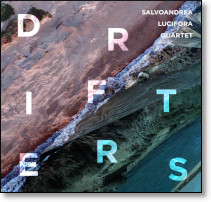 |
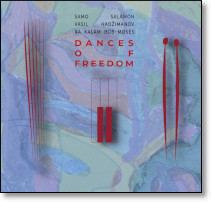 |
 |
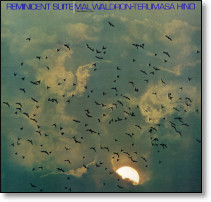 |
Expanded blog post, January archive (in progress).
Tweet: Music Week: 46 albums, 6 A-list
Music: Current count 41743 [41697] rated (+46), 16 [19] unrated (-3).
Over the weekend, I cobbled together another substantial Speaking of Which (130 links, 7048 words). Feels pretty hopeless, but did give me a couple days respite from a week of flopping haplessly, accomplishing nothing.
Speaking of nothing, here's this week's catch. Five of six A- releases are jazz; four of six are 2024 releases. The best of the batch is the exception to both generalizations, which seems about right. They all seem rather marginal, but so do most things these days. Still, they're all interesting, very accomplished records, as are the next tier down. By the way, there's more "burger highlife" coming from the "mysterious bin-bags" that brought forth the Jewel Ackah record.
No telling how far behind I am with various bookkeeping tasks. One thing I did manage to do was to add results from Brad Luen's The 13th Annual Expert Witness Poll to the EOY aggregate, all the way down to the singletons. Several things there I still haven't heard.
New records reviewed this week:
- Deena Abdelwahed: Jbal Rrsas (2023, Infiné): [sp]: B+(***)
- Acid Arab: Trois (2023, Crammed Discs): [sp]: B+(**)
- Don Braden: Earth Wind and Wonder Volume 2 (2023, self-released): [sp]: B
- Helena Deland: Goodnight Summerland (2023, Chivi Chivi): [sp]: B+(*)
- Disclosure: Alchemy (2023, Apollo/AWAL): [sp]: B
- DJ Girl: Hellworld (2023, Planet Mu): [sp]: B+(**)
- DJ Ws Da Igrejinha: Caça Fantasma, Vol. 1 (2023, Dalama): [sp]: B
- Dragonchild: Dragonchild (2023, FPE): [sp]: B+(**)
- Baxter Dury: I Thought I Was Better Than You (2023, Heavenly): [sp]: B
- Enji: Ulaan (2023, Squama): [sp]: B
- FACS: Still Life in Decay (2023, Trouble in Mind): [sp]: B+(**)
- Amanda Gardier: Auteur: Music Inspired by the Films of Wes Anderson (2022 [2024], self-released): [cd]: A-
- Samuel Goff/Camila Nebbia/Patrick Shiroishi: Diminished Borders (2023, Cacophonous Revival): [bc]: B+(***)
- Vinny Golia/Max Johnson/Weasel Walter: No Refunds (2014 [2023], Unbroken Sounds): [sp]: B+(**)
- Hands & Tongues: 3 Meta-Dialogues (2023, 4DaRecord): [cd]: B-
- Anders Jormin/Lena Willemark: Pasado En Claro (2023, ECM): [sp]: B+(**)
- La Sécurité: Stay Safe (2023, Mothland): [sp]: A-
- Alex Lahey: The Answer Is Always Yes (2023, Liberation): [sp]: B+(**)
- Maurice Louca Elephantine Band: Moonshine (2023, Sub Rosa/Northern Spy): [sp]: B+(***)
- Salvoandrea Lucifora Quartet: Drifters (2022 [2023], Trytone): [cd]: A-
- Lyia Meta: Always You (2023, self-released): [sp]: B
- Stephan Micus: Thunder (2020-22 [2023], ECM): [sp]: B
- Camila Nebbia: Una Ofrenda a la Ausencia (2023, Relative Pitch): [sp]: B+(**)
- Lothar Ohlmeier/Tobias Klein: Left Side Right (2023 [2024], Trytone): [cd]: B+(**) [02-16]
- Omnigone: Against the Rest (2023, Bad Time): [sp]: B+(*)
- Pardoner: Peace Loving People (2024, Bar/None): [sp]: B+(*)
- Reggie Quinerly: The Thousandth Scholar (2023 [2024], Redefinition): [cd]: B+(**)
- Naoko Sakata: Infinity (2023, Pomperipossa): [sp]: B+(*)
- Samo Salamon/Vasil Hadzimanov/Ra-Kalam Bob Moses: Dances of Freedom (2021 [2024], Samo): [cd]: A-
- Sigur Rós: Átta (2023, Krunk/BMG): [sp]: B-
- Ches Smith: Laugh Ash (2023 [2024], Pyroclastic): [cd]: B+(*) [02-02]
- Jimi "Primetime" Smith & Bob Corritore: The World in a Jug (2023, Vizztone/SWMAF): [sp]: B+(***)
- Jim Snidero: For All We Know (2023 [2024], Savant): [cd]: A- [02-16]
- Jonathan Suazo: Ricano (2023, Ropeadope): [sp]: B+(***)
- Surgeon: Crash Recoil (2023, Tresor): [sp]: B+(***)
- Rob Sussman: Top Secret Lab (2023, Sus4music): [cd]: B+(*)
- Tomu DJ: Crazy Trip (2023, No Bias, EP): [sp]: B+(***)
- Rian Treanor & Ocen James: Saccades (2023, Nyege Nyege Tapes): [sp]: B+(**)
- Katie Von Schleicher: A Little Touch of Schleicher in the Night (2023, Sipsam): [sp]: B+(*)
- Bobby West: Big Trippin' (2023, Soulville Sound): [sp]: B+(*)
Recent reissues, compilations, and vault discoveries:
- Jewel Ackah: Electric Hi-Life (1986 [2023], BBE): [sp]: B+(***)
- Eddie Lockjaw Davis Quartet: All of Me (1983 [2023], SteepleChase): [sp]: B+(***)
- J Jazz: Deep Modern Jazz From Japan Volume 4: The Nippon Columbia Label 1968-1981 (1968-81 [2023], BBE): [sp]: B+(***)
- WaJazz: Japanese Jazz Spectacle Vol. I: Deep, Heavy and Beautiful Jazz From Japan 1968-1984: The Nippon Columbia Masters (1968-84 [2022], Universounds): [sp]: B+(**)
- WaJazz: Japanese Jazz Spectacle Vol II: Deep, Heavy and Beautiful Jazz From Japan 1962-1985: The King Records Masters (1962-85 [2023], Universounds): [bc]: B
- Mal Waldron/Terumasa Hino: Reminscent Suite (1973 [2024], BBE): [sp]: A-
Old music:
- Camila Nebbia/Patrick Shiroishi: The Human Being as a Fragile Article (2021, Trouble in Mind): [sp]: B+(**)
- Tomu DJ: Feminista (2021, self-released): [sp]: B+(**)
Unpacking: Found in the mail last week:
- Acceleration Due to Gravity: Jonesville: Music by and for Sam Jones (Hot Cup) [02-16]
- Annie Chen: Guardians (JZ Music) [02-23]
- Daggerboard: Escapement (Wide Hive) [03-08]
- Emmeluth's Amoeba: Nonsense (Moserobie) [02-09]
- Kaze: Unwritten (Circum/Libra) [02-09]
Sunday, January 28, 2024
Speaking of Which
Wednesday, January 24, 2024
Daily Log
Clifford Ocheltree pointed me to this Acclaimed Music link, which appears to be an individual's statistical analysis based on a subset of the total data: Solitair selected 11 US/Canada sources, 9 UK, from 13 EUR/Australia. The result is a weighted list of 236 albums, the top 100 featured as "headliners." The comments also include a link to a Google spreadsheet used to generate the results.
I haven't yet found the official spreadsheet, possibly due to this comment under this link: "You do not have the required permissions to view the files attached to this post." Also note this comment from panam:
I believe that in 2024, younger generations are abandoning written music criticism and consuming more YouTube and social media critics. If you review their year lists you will find a mostly different profile and in another direction (especially under 30). It may be hateful to say it but written music criticism has aged and will naturally advocate nostalgia.
HP just raised the price for my Instant Ink plan (50 pages/month) from $3.99 to $4.99 per month. After my initial shipment of Instant Ink shortly after I bought the HP Office Jet Pro 9010, they have billed me over $100, and never shipped any additional ink. That's probably because the printer has rarely worked -- almost never from my Linux-based printers (though they supposedly have good Linux support -- a major buying point for me). I've never come close to using the allowance, so you'd think I have a rollover allowance, but they cancel the unused pages. On notice of the price increase (the second since I bought the printer), I went to cancel, only to find the following messages:
- Instant Ink subscription cartridges will no longer work after my final billing cycle ends, even if they are already installed in my printer. I need to purchase store bought cartridges to continue printing.
- Because Instant Ink bills at the end of the each billing cycle I will receive one final bill for $3.99, plus charges for any additional pages printed.
- I will lose any trial months, prepaid credits, and rollover pages associated with my account.
- Any add-on services to my subscription, such as paper add-on, will also be cancelled.
Evidently the Instant Ink cartridges are wired for remote destruction, so you don't even own the ink you've paid through the nose for.
I backed down and switched to a 10 page/month plan (30 rollover), for $1.49/month. I looked for some way to send a message to someone using the hpsmart.com website, and was unable to find any such thing. (I mean, "Chat with Virtual Assistant" isn't anything, right?)
It's only a matter of time before the printer goes into the trash.
I suppose I could still use it as a scanner, but thus far I've never been able to scan using xsane (finds device, does test scans, chokes on sending anything full res). I have been able to scan using simplescan, but it lacks the extensive controls of xsane.
I've never tried using it as a copier, which is a big selling point of all-in-one printers.
I have been able to print from my phone, but I almost never use my phone for internet browsing, and don't use it for email or other such tasks, so being able to print from it is practically useless.
As a local printer, sometimes it works, but most often it doesn't. CUPS sets up multiple interfaces to the printer. The printer was originally set up to use wi-fi, which is probably a big part of the problem. I recently hooked a USB cable from it to one computer, in hopes that might provide a more reliable path, but I haven't disabled the wi-fi.
I have a much older HP LaserJet 1300 printer, that has worked reliably for many years, until it finally ran out of toner. I refilled it with a third-party cartridge, which for a while produced a streak down the left-side of the page, then eventually cleared up. Recently, the printer stopped working, with a flashing yellow light -- which supposedly indicates either a paper jam or out of toner. The former isn't obvious, and the latter seems unlikely given how little use the printer has gotten since the toner change.
I have found a page on HPLIP support and diagnostics, but right now I'm too upset to put any serious effort into troubleshooting this problem.
Fragment from a letter I sent to a corespondent who recently moved to Idaho:
I take it you're in/near Boise these days. I have relatives in Idaho -- admittedly, a dying breed, with two dear cousins lost in the last couple years. I had an uncle, born like my mother in the tick-infested hollers of the Arkansas Ozarks, where he was a blacksmith, before he got a job on the railroad, and they deposited him in Pocatello. He liked having higher mountains and bigger game, and that he could keep a horse in his backyard (in what was otherwise a normal city block). He eventually built a corral out back, and a barn he moved into when his wife threw him out (although he was just as likely to sleep in the covered bed of his pickup). He was in rodeos, and supplemented his retirement income shoeing horses. He had a hoist that made that relatively easy.
We went out there a couple times in the 1960s, also spending time in Twin Falls, where his son had a floor covering business, which he ultimately developed into a real estate/builder empire, and his daughter taught school -- when she retired, she got a job as a driver/companion for an older rich guy who spent nine months a year RV'ing all around the country. I got to know them both pretty well since we moved to Wichita in 1999. He died a couple years back. She really retired to Arizona, but after a stroke moved to a facility adjacent to one of her daughters, so she's in northeastern South Dakota these days.
I have another cousin who moved from Kansas to Soda Springs, which is southeast of Pocatello, close enough to Yellowstone they have an hourly geyser in the middle of town, and a huge pile of Monsanto detritus on the outskirts. Her husband of 63 years passed a couple months ago, so she's feeling pretty lonely.
I also had an uncle who moved to Snohomish (later Everett), WA around 1940. We went up there for the World's Fair in 1962, and drove back through Idaho. I wanted to stop there and see the state capitol building, so we took a detour, drove around the block, and my dad tried to triangulate his way back onto the highway, as one could always do in Kansas. Just a few blocks later, we found ourselves out of town, heading northeast on a road to nowhere (actually, we already were in the middle of nowhere, nothing but yellow scrub as far as one could see), so it was one of the few times I could say he got lost and had to turn around.
Last time I drove past Boise, I was amazed at all the sprawl. Probably just extends along the highway, without a lot of cross-section, but looked to be a real city/metro area, with all the modern urban comforts of, well, Wichita, anyway.
Monday, January 22, 2024
Music Week
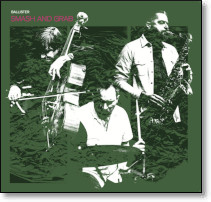 |
 |
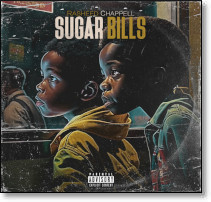 |
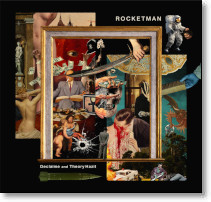 |
 |
 |
 |
Expanded blog post, January archive (in progress).
Tweet: Music Week: 56 albums, 7 A-list
Music: Current count 41697 [41641] rated (+56), 19 [22] unrated (-3).
I wrote a pretty substantial Speaking of Which over the weekend, including more on the ongoing genocide in Gaza, and on why Israel wants to see the rest of the Middle East up in flames, figuring that will force the Americans into the fight, as opposed to their usual role, which is giving Israel arms, money, and advice (which they are freer than ever to ignore, although Netanyahu was more public than usual in slapping Biden down over the two-state fantasy). I've added a couple more links since initial posting (look for the red right-border stripe), and will probably add a few more before (or after) this gets posted.
Also stuff there on Iowa and New Hampshire, as Republicans continue to embrace the criminality their leaders have been promoting at least since Nixon.
I haven't made anything like a transition to knuckling down on the book yet. A big chunk of last week went to adding all of the Jazz Critics Poll ballots to my EOY aggregate. The result was, predictably enough, a massive surge for jazz albums in the overall standings:
- Jaimie Branch: Fly or Die Fly or Die Fly or Die ((World War)) (International Anthem)
- James Brandon Lewis Red Lily Quintet: For Mahalia With Love (Tao Forms)
- Jason Moran: From the Dancehall to the Battlefield (Yes)
- Matana Roberts: Coin Coin Chapter Five: In the Garden (Constellation)
- Steve Lehman/Orchestre National de Jazz: Ex Machina (Pi)
- Kris Davis: Diatom Ribbons Live at the Village Vanguard (Pyroclastic)
- Tyshawn Sorey: Continuing (Pi)
- Darcy James Argue's Secret Society: Dynamic Maximum Tension (Nonesuch)
- Lakecia Benjamin: Phoenix (Whirlwind)
- Irreversible Entanglements: Protect Your Light (Impulse!)
I expect those standings to slide back down over the next week, although I'm still searching specifically for jazz lists. Since I finished with the ballots, I've already seen one change, where Jaimie Branch pulled back ahead of James Brandon Lewis -- the former has had quite a bit of crossover list support, but only came in 9th in the Poll. Matana Roberts, Lakecia Benjamin, and Irreversible Entanglements also do somewhat better away from the jazz critics.
I haven't added Brad Luen's Expert Witness Poll results in yet, but did manage to pick up some individual ballots. A late expansion of Greg Morton's list led me to Brazilian singer Patricia Bastos this week. I also picked up two more A- titles from the extraordinary Hip Hop Golden Age list. I also happened on some pretty decent electronica while adding Mixmag's 169 albums to the aggregate. And when I got hard up for something to play at the moment, I dipped into the 2024 queue, usually (not always) finding items that are already out.
I'll probably spend some more time wrapping up the EOY aggregate, and checking out some of the albums I'm only now finding out about, but should be winding that down this week. I also have a few things on the Jazz Critics Poll left to wrap up, and some mail I haven't gotten to. I also have a database update to the Robert Christgau website almost ready to go.
New records reviewed this week:
- Agust D: D-Day (2023, Big Hit Music): [sp]: B+(*)
- Altin Gün: Ask (2023, Glitterbeat): [sp]: B+(*)
- B. Cool-Aid: Leather Blvd. (2023, Lex): [sp]: B+(*)
- Ballister: Smash and Grab (2021 [2023], Aerophonic): [cd]: A-
- Patricia Bastos: Vos Da Taba (2023, self-released): [sp]: A-
- Big O: In the Company of Others (2023, Vintage Soundz): [bc]: B+(*)
- Black Milk: Everybody Good? (2023, Mass Appeal): [sp]: B+(*)
- Blonde Redhead: Sit Down for Dinner (2023, Section1): [sp]: B+(*)
- Apollo Brown & Planet Asia: Sardines (2023, Mello Music Group): [sp]: B+(***)
- John Butcher/Dominic Lash/Emil Karlsen: Here and How (2022 [2023], Bead): [sp]: B+(**)
- Rasheed Chappell & the Arcitype: Sugar Bills (2023, Project City Music Group): [sp]: A-
- Gerald Cleaver: 22/23 (2023, Positive Elevation/577): [sp]: B+(***)
- Declaime and Theory Hazit: Rocketman (2023, SomeOthaShip): [sp]: A-
- Mike Flips/Nord1kone/Seize: Life Cycles (2023, SpitSLAM): [sp]: B+(**)
- Anne Foucher & Jean-Marc Foussat: Chair Ça (2022 [2024], Fou): [cd]: B+(***)
- Jean-Marc Foussat/Daunik Lazro: Trente-Cinq Minutes & Vingt-Trois Secondes (2023 [2024], Fou): [cd]: B+(***)
- Satoko Fujii Tokyo Trio: Jet Black (2023 [2024], Libra): [cd]: B+(***) [01-24]
- Peter Gabriel: I/O (2023, Real World): [sp]: B+(*)
- Geese: 3D Country (2023, Partisan): [sp]: B-
- Gorillaz: Cracker Island (2023, Parlophone/Warner): [sp]: B
- Marina Herlop: Nekkuja (2023, Pan): [sp]: B+(*)
- Gregory Alan Isakov: Appaloosa Bones (2023, Dualtone): [sp]: B
- Ethan Iverson: Technically Acceptable (2024, Blue Note): [sp]: B+(*)
- Ja'king the Divine: Parables of the Sower (2023, Copenhagen Crates): [sp]: B+(***)
- Benjamin Koppel/Scott Colley/Brian Blade: Perspective (2023, Cowbell Music): [sp]: B+(**)
- Benjamin Koppel: White Buses: Passage to Freedom (2023, Cowbell Music): [sp]: B+(***)
- Talib Kweli & Madlib: Liberation 2 (2023, Luminary): [sc]: B+(***)
- Oliver Lake/Mathias Landæus/Kresten Osgood: Spirit (2017 [2023], Sfär): [sp]: B+(**)
- Lalalar: En Kötü Iyi Olur (2023, Bongo Joe): [sp]: B+(***)
- Dave Lombardo: Rites of Percussion (2023, Ipecac): [sp]: B+(**)
- Van Morrison: Accentuate the Positive (2023, Exile/Virgin): [sp]: B+(**)
- Riley Mulherkar: Riley (2021-22 [2024], Westerlies): [cd]: B+(***) [02-16]
- Estee Nack: Nacksaw Jim Duggan (2023, Griselda): [sp]: B+(*)
- Ndox Electrique: Tëd ak Mame Coumba Lamba ak Mame Coumba Mbang (2023, Bongo Joe): [sp]: B+(*)
- Noertker's Moxie: In Flitters: 49 Bits From B*ck*tt (2023, Edgetone): [cd]: B+(***)
- Hery Paz: Jardineros (2023, 577): [sp]: B+(**)
- Shaheed & DJ Supreme: The Art of Throwing Darts (2023, Communicating Vessels): [sp]: B+(***)
- Shakti: This Moment (2023, Abstract Logix): [sp]: B+(*)
- Louis Siciliano: Ancient Cosmic Truth (2023, Musica Presente, EP): [sp]: B+(**)
- Antero Sievert: Dear Bossa (2023, JMI): [sp]: B+(***)
- Guilty Simpson: Escalation (2023, Uncommon): [sp]: B+(**)
- Josh Sinton: Couloir & Book of Practitioners Vol. 2: Book W (2023 [2024], Form Is Possibility, 2CD): [cd]: B+(***)
- Alex Sipiagin: Mel's Vision (2022 [2023], Criss Cross): [sp]: B+(**)
- Sister Zo: Arcana (2023, All Centre, EP): [sp]: A-
- Chucky Smash: The Taking of Pelham One Two Three (2023, King of the Beats): [sp]: B+(*)
- Spectacular Diagnostics: Raw Lessons (2023, Rucksack): [sp]: B+(**)
- Marnie Stern: The Comeback Kid (2023, Joyful Noise): [sp]: B+(**)
- The Dave Stryker Trio With Bob Mintzer: Groove Street (2023 [2024], Strikezone): [cd]: B+(**)
- Sweeping Promises: Good Living Is Coming for You (2023, Sub Pop): [sp]: B+(**)
- Emilio Teubal: Futuro (2021 [2023], Not Yet): [sp]: B+(**)
- V Knuckles & Phoniks: The Next Chapter (2023, Don't Sleep): [sp]: B+(***)
- Yungmorpheus & Real Bad Man: The Chalice & the Blade (2023, Real Bad Man): [sp]: B+(**)
- Yungmorpheus: From Whence It Came (2023, Lex): [sp]: B+(*)
Recent reissues, compilations, and vault discoveries:
- Per 'Texas' Johansson: Alla Mina Kompisar (1998 [2023], Moserobie): [sp]: A-
- Kenneth Kiesler/University of Michigan Opera Theatre: James P. Johnson: De Organizer/The Dreamy Kid (Excerpts) (2006 [2023], Naxos): [sp]: B+(*)
Old music:
- Talib Kweli/Madlib: Liberation (2007, Blacksmith Music): [yt]: A-
Unpacking: Found in the mail last week:
- Carlos "Bechegas"/Joao Madeira/Ulrich Mitzlaff: Open in Finder (4DaRecord) [11-13]
- Mina Cho: "Beat Mirage" (International Gugak Jazz Institute) [02-09]
- Hands & Tongues: 3 Meta-Dialogues (4DaRecord) [12-08]
- Richard Nelson/Makrokosmos Orchestra: Dissolve (Adhyâropa) [02-02]
- Samo Salamon/Vasil Hadzimanov/Ra-Kalam Bob Moses: Dances of Freedom (Samo) [01-15]
- Matthew Shipp/Steve Swell: Space Cube Jazz (RogueArt) [01-15]
- Ches Smith: Laugh Ash (Pyroclastic) [02-02]
Sunday, January 21, 2024
Speaking of Which
Lots of stuff below. No need for an introduction here.
Top story threads:
Israel:
Mondoweiss:
[01-16] Day 102: Israel pulls thousands of forces from Gaza as Hamas announces death of two captives.
[01-17] Day 103: Israeli army attacks vicinity of southern Gaza hospital, kills 7 in West Bank drone strikes.
[01-20] Day 106: Israel bombs Gaza, Lebanon and Syria, U.S. bombs Yemen.
[01-21] Day 107: Israel bombs two more hospitals in Gaza as official death toll crosses 25,000.
Ramzy Baroud: [01-19] 100 days of war and resistance: Legendary Palestinian resistance will be Netanyahu's downfall: You do see what's happening here? The more Israel attacks, the more valiant (and necessary) armed resistance appears. And even if they do manage to scratch off their list of Hamas bad guys, as long as Israel is the one beating Gaza down, resistance will return.
Ronen Bergman/Patrick Kingsley: [01-20] In strategic bind, Israel weighs freeing hostages against destroying Hamas: "Some Israeli commanders said the government's two main goals were mutually incompatible."
Jason Burke: [01-19] 'We cannot operate, we have no drugs': Gaza's indirect casualties mount as health service decimated.
Nylah Burton: [01-20] Palestine awakens the revolution: I wouldn't put much stock in this "revolution," but the relentless slaughter and destruction is stirring immense resentment, not just among its immediate victims but others who see analogous powers (e.g., the US) as responsible for their own maladies. Israel doesn't care, because they've resigned themselves to perpetual war, but even they have little inkling of the hatred they're stirring up.
Jason Ditz: [01-20] Israel bombs Damascus residential building, kills four Iranian Guard members.
Mel Frykberg: [01-17] Netanyahu accused of risking WWIII to save his own skin.
Tareq S Hajjaj: [01-17] The shocking inhumanity of Israel's crimes in Gaza.
Shatha Hanaysha/Yumna Patel: [01-18] Drone strikes, mass arrests, and demolitions: Massive Israeli raid kills at least 11 Palestinians in northern West Bank.
Amjad Iraqi: [01-17] Israel's right to tyranny: "In justifying the violent unraveling of Gaza as 'self-defense,' Western capitals have once again signed off on Israelis' license to act like despots."
Gideon Levy: [01-17] Israel wants a Palestinian Intifada in the West Bank.
Nancy Murray/Amahl Bishara: [01-16] In Gaza, Israel has turned water into a weapon of mass destruction.
James North: [01-19] Netanyahu just said Israel will permanently occupy the land 'from the river to the sea.' The U.S. media is covering it up.
Jonathan Ofir: [01-19] If you're surprised by Netanyahu's 'river to the sea' comment, you haven't been paying attention: "Benjamin Netanyahu has never made it a secret that he opposes the establishment of a Palestinian state and insists on total Israeli control over 'the territory west of the Jordan River.'"
Samah Sabawi: [01-21] War on Gaza: 'There is nothing left. They destroyed everything.'
Asa Winstanley: [01-20] Israeli HQ ordered troops to shoot Israeli captives on 7 October. This is one of the few articles I've seen to provide details on Israel's counteroffensive on October 7. This follows up on previous reporting by the author:
Genocide watch, around the world: But mostly in Washington.
Michael Arria: [01-18] The Shift: IU cracks down on Palestine, Sanders Israel resolution flops.
Phyllis Bennis: [01-18] The US attacks on Yemen are a dangerous escalation.
DeNeen L Brown: [01-20] Why Namibia invoked a century-old German genocide in international court. The 1904-08 extermination of the Herero and Nama has come to be viewed as the transition event between the casual starvation and massacres characteristic of 19th century colonialism and the more mechanized slaughter of the 20th century. My first encounter with the story was in Thomas Pynchon's novel, V.
Shane Burley: [01-15] Jewish activists mobilizing against war are finding a new community.
David Dayen: [01-16] Attempt to get Congress to do something on foreign policy fails. Bernie Sanders offered a resolution to "require the State Department to write a report detailing any human rights violations stemming from the use of U.S. military equipment and funding in conjunction with Israel's bombardment of Gaza since the October 7 attacks." Ben Cardin (D-DE) denounced the resolution as "a gift to Hamas," and it was tabled, 71-11.
Melvin Goodman: [01-19] The dangerous myth of the "indispensable nation".
Zaha Hassan: [01-18] Why the United States can't ignore the ICJ case against Israel.
Fred Kaplan:
[01-18] The real reasons the Middle East is blowing up right now. He doesn't say so plainly, probably because he wants to preserve some sense of polarity between Israel and Iran, but I'll give you two big reasons. One is that none of the many sides in the region feel they can afford to back down and defuse a conflict, because they don't trust the other side to reciprocate, and because they fear that backing down will make them look weak, and that will invite further aggression. That's an old saw, often illustrated with Chamberlain's appeasement of Hitler at Munich, but it entered the modern Middle East through Israel, which has always formulated its demands in ways that allowed no compromise. (I can rattle off ten clear examples here.) And because Israel is insatiable, its enemies have learned not to appease it. And the US has basically bought into Israel's line of thinking, partly because Americans seem to be incapable of original thought on the subject, partly because they're so conceited about their superpower status.
But that's just the tactical level. The deeper problem is that Israel wants to see the whole Middle East blow up, because that gives them cover to carry out their genocide in Gaza, as far as they can extending it into the West Bank, and because it more war will tie down the Americans, who'll wind up having to do most of the fighting, and that will reinforce their subservience to Israel. Israelis certainly understand that no matter how much Nazis hated Jews, the only way they were able to kill so many was under the fog and chaos and dehumanization of a much larger war.
[01-19] America's terror designation for the Houthis only encourages them -- and Iran.
Mohammad Asif Khan/Aisha Siddiqui: [01-17] Palestine solidarity protests face repression in Modi's India.
Stephanie Kirchgaessner: [01-18] 'Different rules': Special policies keep US supplying weapons to Israel despite alleged abuses.
Daniel Levy: [01-17] Team Biden needs a reset on Israel.
Nesrine Malik: [01-15] It's not only Israel on trial. South Africa is testing the west's claim to moral superiority.
Blaise Malley: [01-18] Why is 'ceasefire' considered a dirty word?
Shaida Nabi: [01-18] Safeguarding Zionist fragility on British campuses.
Matthew Petti: [01-16] Congress forms caucus to aid Iranian ex-terror group. Isn't the MeK still a terror group, even if they're now "one of ours"?
Stephen Prager: [01-17] Israel has no defense: "After South Africa laid out a damning case of genocidal intent against Israel in international court, Israel responded by shrugging it off, hardly even mounting a defense."
Norman Solomon: [01-19] How the Gaza war can be big news and invisible at the same time. Also published in Salon as Why we're not seeing the real Gaza war in the media.
Robert Wright: [01-19] How the US created the "Iran-backed Houthis". Also on this:
Matt Purple: [01-17] Don't like radical Houthis? Blame Bush's wars.
Trump, and other Republicans: Trump's sweep of the Iowa caucuses was easily predicted, and seems definitive, but 52% of practically nothing against practically nobody doesn't exactly impress as rock solid -- the glut of endorsements suggest that, at least among Republican officeholders, Trump is more feared than loved. Trump looks good to win New Hampshire next week with a similar near-50% split, but this time with DeSantis way behind a very second-place Haley (Jan. 20 poll averages: Trump 48.9%, Haley 34.2%, DeSantis 5.2%). Then comes South Carolina, where the polling shows: Trump 60.9%, Haley 24.8%, DeSantis 8.9%. I expect Haley and DeSantis to hang in through Super Tuesday -- DeSantis can expect to do about as well in Florida as Haley in South Carolina, which is to say not much -- where the current national polls should be indicative: Trump 66.2%, Haley 12.3%, DeSantis 11.1%. After that it's all over, which should leave Trump plenty of time for courtrooms.
PS: I wrote the above before this [01-21] Ron DeSantis ends presidential campaign, endorses Trump. Given that there are no significant policy differences between Republican candidates, the standard reason for quitting is that your backers pulled their money, which was clearly in the cards. Quitting now and endorsing Trump avoids Tuesday's embarrassment, and gives him a chance to claim a bit of Trump's margin (maybe even the whole margin, if it's slim enough).
Dennis Aftergut/Laurence H Tribe: [01-16] Judge Aileen Cannon is quietly sabotaging the Trump classified documents case: The judge was a Trump appointee, with a fairly long record of showing favor in this case.
Ryan Bort: [01-16] Every awful thing Trump has promised to do in a second term: A checklist, but complete? Also note that while he never came close to fulfilling all the awful promises of his 2016 campaign, he (and/or his minions) did a lot of really awful things they didn't advertise in the campaign. Still, all the deliberate malevolence Republicans aspire to probably pales next to their incompetence at dealing with the crises their policies feed into. Also, the opportunity costs of ignoring, misunderstanding, and/or mishandling real problems -- most obviously climate change, but the list is much longer.
Tim Dickinson: [01-17] Christian nationalists team up on illicit push to get churches to campaign for Trump: "Far-right 'apostle' Lance Wallnau and Turning Point USA are partnering on a campaign to turn swing-state churches into Trump turnout machines."
Lulu Garcia-Navarro: Inside the Heritage Foundation's plans for 'institutionalizing Trumpism': An interview with Kevin D Roberts, on how he plans to use Donald Trump to finally destroy America.
Margaret Hartmann:
Sarah Jones: [01-17] The class war on kids. E.g., in Mississippi: "Children are casualties in a much older right-wing campaign to keep the poor in their place."
Hannah Knowles/Meryl Kornfield: [01-21] Loyalty, long lines, 'civil war' talk: A raging movement propels Trump.
Sharon LaFraniere/Alexandra Berzon: [01-21] How Nikki Haley's lean years led her into an ethical thicket: "From her earliest days in South Carolina politics, Ms. Haley's public service paid personal financial dividends." This is, of course, minor league stuff compared to Trump graft, but still, as they say, speaks to character.
Eric Levitz:
[01-15] How Trump went from disgraced insurrectionist to Iowa caucus winner. One key subhed here is: "Conservatives have too little trust in liberal democracy to recoil from Trump's attacks on it."
[01-20] The GOP is moderating -- and coming unhinged: "While far-right Republicans make it hard to keep the government running, others in their party have been reaching constructive legislative compromises."
Matt Lewis: [01-20] 7 reasons Ron DeSantis' campaign was dead on arrival.
Nicole Narea: [01-17] A calendar of Trump's upcoming court dates -- and how they could overshadow the GOP primary.
Tori Otten: Paul Gosar whines there aren't enough white people in the military.
Andrew Prokop:
[01-16] 1 winner and 3 losers from the Iowa caucuses: Winner was Donald Trump; losers: Ron DeSantis, Nikki Haley, Vivek Ramaswamy.
[01-15] Is it over yet? What the Iowa caucus results mean for the GOP presidential race.
Nathaniel Rakich: [09-11] Ron DeSantis probably didn't turn Florida red: A bit late in noticing this piece, but a useful statistical profile. The most important chart is the one comparing partisan turnout over the years. Democrats have done a really poor job of getting their voters out, especially in 2022.
Andrew Rice: [01-18] The one room Trump can't dominate: "This time there was no getting away with attacking his rape accuser, E. Jean Carroll."
Aja Romano: [01-18] If you want to understand modern politics, you have to understand modern fandom.
Areeba Shah: [01-20] MAGA fans cry "fraud" in Iowa -- despite Trump's huge win. How can it not be suspicious is it that Trump lost one county (of 99) by one vote to Haley?
Tatyana Tandanpolie: [01-21] Scholars worry Haley and Ramaswamy's race-blindness helps GOP advance "white supremacist worldview": "Republican denials of racism in the US help feed 'fantasy of white victimhood,' professor says."
Scott Waldman: [01-16] No more going wobbly in climate fight, Trump supporters vow.
Li Zhou: [01-18] Congress averted a shutdown, but the funding fight isn't over.
James D Zirin: [01-13] Trump the autocrat at the counsel table.
No More Mister Nice Blog: Steve M. has been one of the sharpest observers of Republican politics all along, but he's had an exceptional week:
[01-16] No, that's not a silver lining: "Haley has a constituency, but it's not Republicans." Sure, he was wrong when he wrote: "DeSantis will drop out after New Hampshire and endorse Trump." He dropped out and endorsed Trump before New Hampshire. As for Haley lasting through South Carolina, we'll see: "but she'll lose both, drop out, and endorse Trump" -- that's a safe bet.
[01-18] How dare Democrats criticize the opposition party in an election year!
[01-20] That new Trump "dementia" clip is worse than you realize.
[01-21] E.J. Dionne misses the point.
Closing tweet by Will Bunch:
It's so tempting to pile on the Ron DeSantis jokes but I keep thinking about the Black voters he had arrested, the kids who had to leave New College, the migrants he tricked onto that plane - all for the sake of the worst campaign in American history. It's actually not that funny.
Biden and/or the Democrats: I haven't seen much comment on this, but the Democrats' decision to cancel Iowa and New Hampshire left the impression this week that only Republicans are running for president in 2024. Biden would certainly have won landslides in both states this time -- after losing both in 2020, only to have his candidacy saved by South Carolina. I suspect that the reason they did this was to deny any prospective challenger a forum to show us how vulnerable Biden might be. As a tactic, I guess it worked -- it's highly unlikely that Biden won't get enough write-in votes in New Hampshire to clear Dean Phillips and Marianne Williamson, and even if he doesn't, it's not like he was actually running -- more a case of New Hampshire just being spiteful jerks (which, as a long-time Massachusetts resident, I can tell you isn't a tough sell). Still, it feels like they're sheltering a lame horse, thereby wasting the opportunity to see who really can run. So while a Trump-Biden rematch looks inevitable, both candidates are in such precarious shape, with such strong negatives, that it's hard to believe that both will still be on the ballot in November. With no serious primaries, and leaders ducking debates -- even Haley has got into the act, figuring DeSantis isn't worthy of debate in New Hampshire, even though she's regularly mopped the floor with him so far -- 2024 may turn out to be a vote with no real campaigning. That may sound like a relief, but it's not what you'd call healthy.
Paul Glastris: [01-16] Joe Biden's economic headwinds.
Luke Goldstein: [01-17] Manchin staffers cash in with big oil: "The West Virginia senator's longtime press aide's move to ExxonMobil is the latest in a long line of revolving door spinners."
Ben Jacobs: [01-17] New Hampshire's messy Democratic primary, explained.
Robert Kuttner: [01-17] Time for Biden to break with Netanyahu: "The plan to depopulate Gaza of Palestinians is one excess too many."
Nicole Narea: [01-17] The Biden administration's plan to slash bank overdraft fees, explained.
Legal matters and other crimes:
Lara Bazelon: [01-21] An 'execute-them-at-any-cost mentality': The Supreme Court's new, bloodthirsty era.
Ian Millhiser:
Kate Riga: [01-17] Gorsuch gleefully leads right-wing cohort in fulfilling their Federalist Society quest.
Mark Joseph Stern: [01-18] The Supreme Court is now complicit in Texas' armed standoff with the Feds. Link here back to the author's previous, related:
Climate and environment:
Matthew Cappucci: [01-21] How the polar vortex could bring winter back with a vengeance.
Emile P Torres: [09-23] Think this summer was bad? It might be the best one you and I will ever see: "The calamitous summer of 2023 was an oasis of tranquility, compared to what's coming."
Economic matters:
Dean Baker: [01-15] The "great" economy Trump left Biden.
Jacobin: [01-19] Stephanie Kelton thinks the conventional wisdom is changing: An interview.
Ukraine War:
Blaise Malley: [01-19] Diplomacy Watch: Zelensky's lonely calls for 10 point peace plan: He's still making maximalist demands, including "withdrawal of Russian troops from all Ukrainian territory and the prosecution of Russian officials for war crimes."
David Rothkopf: [01-19] The GOP is actively supporting Russia's Ukrainian genocide: So, if this guy thinks Russia is committing genocide in Ukraine, why isn't he up in arms against what Israel is doing in Gaza? What Russia is doing is criminal and reprehensible on many levels, but it's not genocide, by any stretch of the imagination. That Russia "openly wishes for the end of the Ukrainian state" isn't even true. They want regime change, to a regime that's friendly to their interests, but if that counted, the US would be guilty of genocide against at least thirty nations since WWII. As for "kidnapped and indoctrinated hundreds of thousands of Ukrainian children," I don't know what you'd call that (let alone whether it's true; it's possible they just moved some children out of the war zone, for their safety), but it's not genocide. Putin might even argue that intervention in Ukraine was necessary to protect ethnic Russians from Ukrainian nationalists -- the term he used was "Nazis," which wasn't quite right but is not totally lacking in historical reference -- but while Ukraine may have behaved prejudicially against ethnic Russians, that too had not remotely risen to the level of genocide. To have any usefulness, the term "genocide" has to denote something extraordinary -- as is the case with Israel's demolition of Gaza.
He is, of course, right that Republicans don't care about Ukrainians. They also don't care about Russians. They don't even care about Americans, or for that matter even their own benighted voters. They just want to win elections, so they can grab power and dole out favors to their sponsors, while punishing their enemies. But for some reason they all seem to love Israel. Maybe because they've set such a role model for how to really smite one's enemies?
Around the world:
- Ellen Ioanes: [01-14] In Taiwan's high-stakes elections, China is the lower.
- Joshua Keating: [01-13] Taiwan elects Lai Ching-te, denying China's hopes for reunification.
Paul Krugman: [01-18] China's economy is in serious trouble. What's the evidence here? That a 5.2% GDP growth may have been politically fudged? That Chinese are investing 40% of GDP instead of spending it on consumer goods? That they may have a real estate bubble? That the population decline reminds him of Japan in the 1990s (which, he admits, wasn't as big a disaster as predicted, but is Xi smart enough to manage it as well?). Finally, he worries that, "scariest of all, will [Xi] try to distract from domestic difficulties by engaging in military adventurism?" China's actual record on that account isn't half as scary as Biden's, whose "soft landing" on inflation owes no small amount to the primed business of making rockets and bombs, and shipping LNG to supplant Russian gas sales to Europe.
Other stories:
Chris Armstrong: [01-08] What if there were far fewer people? I mention this mostly because I had cited a NY Times piece by Dean Spears, The world's population may peak in your lifetime, but searched in vain for an adequate rejoinder. One could make more points, but this, at least, is a start. It is well known that population growth alarms -- most famously those by Malthus and Ehrlich -- were easily exaggerated into doomsday scenarios that have at least been dodged, even if their logic has never really been refuted. By the way, the "cornucopian" counter-theories have rarely if ever been tested, mostly because no one takes them seriously. (For a recent discussion of Malthus, see J Bradford DeLong's Slouching Towards Utopia: An Economic History of the Twentieth Century.) Population growth is something we have a lot of experience coping with, but make no mistake, it is a strain that always requires compensatory changes.
As for population decline, that's rarely occurred, and never been a serious problem. Certainly, it's not one that Malthus could imagine, as he was perfectly aware of the standard solution: have more children. Spears' conjecture -- that population will peak in 2085 then decline ("perhaps precipitously") thereafter, is far enough into the future as to be the last thing we should bother with (aside from, you know, the Sun turning super-nova, that is).
David Dayen: [01-18] An unequal tax trade: "The business tax credits in the Wyden-Smith deal are five times as generous as the Child Tax Credit expansion." This on the "bipartisan" bill that seems to be finally working its way through Congress. Also see:
Jackson Diiani: [01-21] Is America like the Soviet Union in 1990? It sometimes feels that way: "America's symptoms of decline are everywhere -- and history tells us what happens if we don't change course." Sure, you can make that case, and find plenty of pictures, like the abandoned diner used here, to illustrate the case. Or you could take the opposite tack, and while noting that there are things that need to be fixed up, those improvements are easily within out means, given a little will to do so.
This article starts with a question: "Who owns the parking meters in Chicago?" The answer is: "Morgan Stanley and the city of Abu Dhabi." A cash-strapped city tried to solve a small problem by turning to the private sector, turning it into a bigger problem. Privatization was the buzz word, sold on the promises of efficiency but expanding the reach of predatory capitalism.
Kevin T Dugan: [01-19] Greed killed Sports Illustrated. Greed kills everything. Related here:
Ezra Klein: [01-21] I am going to miss Pitchfork, but that's only half the problem: I land on Pitchfork 3-5 times a week (on average, just a guess), but rarely read anything there, and can't imagine missing it much. Of the list below, Vox is the only one I would miss.
Sports Illustrated just laid off most of its staff. BuzzFeed News is gone. HuffPost has shrunk. Jezebel was shut down (then partly resurrected). Vice is on life support. Popular Science is done. U.S. News & World Report shuttered its magazine and is basically a college ranking service now. Old Gawker is gone and so too is New Gawker. FiveThirtyEight sold to ABC News and then had its staff and ambitions slashed. Grid News was bought out by The Messenger, which is now reportedly "out of money." Fusion failed. Vox Media -- my former home, where I co-founded Vox.com, and a place I love -- is doing much better than most, but has seen huge layoffs over the past few years.
News publications are failing too, and while some people are making a good living writing on Substack (including his increasingly vacuous co-founder Matthew Yglesias), most don't make any living at all. As Klein puts it: "A small audience, well monetized, is a perfectly good revenue stream." That's how these people -- at least the more successful ones -- think, with the corollary being: and if you don't cater to a rich-enough audience, you deserve to die. If we cared about democracy, we'd do something to make sure we had a reasonably well-informed and thoughtful citizenry. But "greed is good" went from being a dirty desire to a shameless motto in the Reagan 1980s, and has remained unquestioned even through Democratic administrations (with their nouveaux riches presidents), leaving the rest of us to live in greed's detritus.
Benjamin Mullin/Katie Robertson: [01-18] Billionaires wanted to save the news industry. They're losing a fortune. Save? More like "own," which is what they're doing. And as they've lost money they made way too easily elsewhere, like vulture capitalists in other industries, they've started to hollow out these venerable brands, until they're just empty shells, allowing nothing to grow in their place.
Elizabeth Dwoskin: [01-21] Growing Oct. 7 'truther' groups say Hamas massacre was a false flag: No use filing this under the Israel sections up top, as it's solely meant to muddy the waters. There is no reason to doubt that militia groups in Gaza, associated with but not identical to Hamas, planned and executed the attack. Israel has a long history of "false flag" operations, but this bears no resemblance to them. The precise scale and effect of the attack are still not clear, but "unprecedented" is a fair description, and the shock was deeply felt, although it quickly gave way to cunning political maneuvers. Israeli leaders had always responded to even the most trivial of attacks from Gaza with threats of extreme punitive violence, so they immediately realized this as an opportunity to implement genocide -- a consideration that had been cultivated for over a century, but only seriously pursued under the cover of the 1948 war (the Nakba remembered by Palestinians as their Holocaust, but never quite recognized as such by the world). The Israeli government quickly worked to mold world opinion -- at least among critical allies like the US, UK, and Germany -- to go along with Israel's destruction and depopulation of Gaza, which meant elevating the by-then-defeated attack to mythic proportions. Such disingenuity was bound to generate "conspiracy theories" like these. For now, they can be dismissed as nonsense, and/or conflated with other easily discredited theories (not least those belonging to antisemitism). But what they do correctly intuit is that there were deceitful political interests at work from the beginning, leaving us with little reason to trust what we are told.
Richard J Evans: [01-17] What is the history of fascism in the United States? Reviews Bruce Kuklich's Fascism Comes to America: A Century of Obsession in Politics and Culture, which starts in 1922 with fascination and fear of Benito Mussolini and traces the use and abuse of the word ever since, noting that "over the years, the concept gradually lost its coherence."
Caroline Fredrickson: [01-19] Elon Musk's war on the New Deal -- and democracy: "The South African-born mogul is now trying to gut the 89-year-old National Labor Relations Board."
William D Hartung: [01-16] The military-industrial complex is the winner (not you): "Overspending on the Pentagon is stealing our future." A record-high $886 billion Defense appropriation bill, another $100 billion-plus for aid to Ukraine and Israel, much more buried in other departments. By the way, Hartung also has a "Costs of War" paper:
Doug Henwood: These are a couple of older pieces I found in "related" links. I don't especially agree with them, but they cast doubts on theories and approaches that sound nice but haven't been overwhelmingly successful.
[2019-02-21] Modern monetary theory isn't helping.
[2021-07-17] Why socialists should distrust antitrust.
Phillip Longman: [01-16] How fighting monopoly can save journalism: "The collapse of the news industry is not an inevitable consequence of technology or market forces. It's the result of policy mistakes over the past 40 years that the Biden administration is already taking measures to fix." I'm pretty skeptical here. Whatever Biden is doing on antitrust enforcement -- after decades of inaction, a bit worse with Republican administrations but still pretty much ineffective with Democrats in charge -- is going to take a long time to be felt. And the argument that "advertising-supported journalism might be the worst way to finance a free press except for all the rest" is worse than defeatist, in that it doesn't even allow the option of treating journalism as a public good, as something we could deliberately cultivate -- instead of just hoping it somehow pans out. The sorry state of journalism today has less to do with constrained competition than with the carnage due to relentless profit-seeking.
Louis Menand: [01-15] Is A.I. the death of I.P.? Well, it should be, and take its own I.P.-ness with it.
Doug Muir: [01-15] The Kosovo War, 25 years later: Things fall apart: Part 3 of a series, that started with [01-08] The Kosovo War, 25 years later and [01-08] The Serbian ascendancy.
Andrew O'Hehir: [01-21] Never mind Hitler: "Late Fascism" is here, and it doesn't need Hugo Boss uniforms: "Fascism has been lurking under the surface of liberal democracy all along -- we just didn't want to see it." Draws on Alberto Toscano's book: Late Fascism: Race, Capitalism and the Politics of Crisis. I'm struck here by the line about how fascism arises "to save capitalism from itself." But it does so by misdirection, never really facing up to the source of its disaffection, leading to its own self-destruction. Such analysis is kids' stuff for Marxists, who start with a fair understanding of the dynamics. Yet it's lost on conventional liberals and conservatives, who assume capitalism is just a force of nature, something they skip over to focus on abstractions (democracy, freedom, etc.).
James North: [01-18] What the media gets wrong about the so-called border crisis: "The mainstream press's dark warnings about a flood of migrants are underpinned by a staggering ignorance about where asylum-seekers are coming from -- and why they're fleeing for their lives."
Rick Perlstein: [01-17] Metaphors journalists live by (Part I): "One of the reasons political journalism is so ill-equipped for this moment in America is because of its stubborn adherence to outdated frames." Framed by a discussion with Jeff Sharlet. Also [01-18] Part II.
Jeffrey St Clair: [01-19] Roaming Charges: It's in the bag. Starts by pointing out the ridiculously low turnout at the Iowa caucuses, which among other things resulted in this: "Amount GOP candidates spent per vote in Iowa: Haley: $1,760; DeSantis: $1,497; Ramaswamy: $487; Trump: $328." Of course, that undervalues the free media publicity given to all, but especially to Trump. Roaming to other topics, here's:
+ According to Jeffrey Epstein's brother, Mark, Epstein "stopped hanging out with Donald Trump when he realized Trump was a crook."
Liz Theoharis: [01-18] Change is coming soon: "The powerful and visionary leadership of young activists is crucial in these times."
Michael Tomasky: The right-wing media takeover is destroying America: "The purchase of The Baltimore Sun is further proof that conservative billionaires understand the power of media control. Why don't their liberal counterparts get it?"
Sandeep Vaheesan: [01-16] Uber and the impoverished public expectations of the 2010s: "A new book shows that Uber was a symbol of a neoliberal philosophy that neglected public funding and regulation in favor of rule by private corporations." The book is by Katie J Wells, Kafui Attoh & Declan Cullen: Disrupting D.C.: The Rise of Uber and the Fall of the City.
Jeff Wise: [01-13] Who will rid us of this cursed plane?: Boeing's "troubled 737 Max," although that's just the most obvious of the problems with Boeing.
David Dayen: [01-19] How Boeing ruined the JetBlue-Spirit merger.
Luke Goldstein: [01-09] Boeing 737 MAX incident a by-product of its financial mindset.
Harold Meyerson: [01-18] The Airbus advantage: "Why Europe's mixed economy produces safer planes than America's financialized capitalism." One more note is that as Boeing (where my father worked 38 years, and my brother a similar stretch) pulled out of Wichita, Airbus moved in to set up an engineering shop, allowing them to pick up some of their better engineers (e.g., ones who didn't want to move to Oklahoma or South Carolina).
Matt Stieb: [01-17] Another Boeing blunder leaves Blinken stuck at Davos.
Thursday, January 18, 2024
Daily Log
Submitted latest list for Brad Luen's EW Poll:
- Olivia Rodrigo: Guts (Geffen) 16
- Rodrigo Amado/The Bridge: Beyond the Margins (Trost) 14
- Buck 65: Punk Rock B-Boy (self-released) 12
- Irreversible Entanglements: Protect Your Light (Impulse!) 12
- Beneficence & Jazz Spastiks: Summer Night Sessions (Ill Adrenaline) 10
- Steve Lehman/Orchestre National de Jazz: Ex Machina (Pi) 10
- James Brandon Lewis Red Lily Quintet: For Mahalia, With Love (Tao Forms) 8
- Billy Woods & Kenny Segal: Maps (Backwoodz Studioz) 6
- The Rempis Percussion Quartet: Harvesters (Aerophonic) 6
- George Coleman: Live at Smalls Jazz Club (Cellar) 6
No opinion on the other questions.
Wednesday, January 17, 2024
Daily Log
Dan Weiss blasted Christgau for reviewing a 12-track Nicki Minaj CD that also came out in an unreviewed 22-track digital version (as well as God-knows-how-many other variants). I commented ("ridiculous" was a term he used):
Sorry if I'm being ridiculous or just negligent, but any time I see an option between a regular and an expanded edition, I stream the regular, and almost never bother with the extras (even if I liked the regular). I didn't see such an option with Minaj, so I streamed the 22-cut version (four times, if memory serves, because I was always on the fence about it). I speculated that maybe the 14-cut cd might present a clearer case, but didn't pursue it. I sympathize with the idea that cd versions are canonical, but I buy virtually nothing these days (and sure don't make enough for the tax write off to soften the blow). I might have edited down a playlist to match the 14 cuts, but Napster makes that painful, and I have no idea how to even do that with Spotify. All respect due to those of you who care enough to sort out those details. But this just strikes me as another triumph of what economists call "the principle of indifference": the notion that you've optimized your returns from pricing options when consumers no longer give a shit.
Yesterday, I commented on Ira Robbins, the subject of a New Yorker piece: Nick Paumgarten: A D.I.Y. Fanzine, Fifth Years On.
One of the first things I did when I moved to NYC was to get in touch with Robbins. He was at the height of his discophobia phase, and we didn't hit it off. I never ran into him again. I don't recall when I stopped reading the magazine, but I probably have all the editions of the guides. If he's still at it, you have to respect that. I, at least, took a 25-year break, during which I had a real career and a semi-normal life, before I got dragged back into music writing.
Edd Hurt added this comment:
I read it, but I never really agreed with their party line. Alex Chilton was talking about NY Rocker and Trouser Press in 1981 when he told me these words to live by: "These Ivy Leaguers, they pretend to be above rock 'n' roll, therefore they understand it totally and everything. They don't really have too much of an idea of what it's all about, as far as I'm concerned."
Monday, January 15, 2024
Music Week
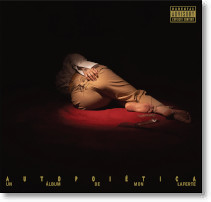 |
 |
 |
 |
 |
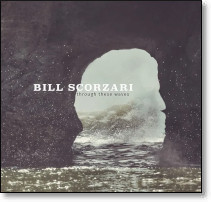 |
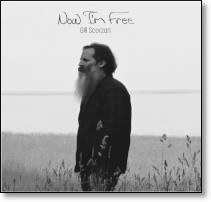 |
Expanded blog post, January archive (in progress).
Tweet: Music Week: 57 albums, 7 A-list
Music: Current count 41641 [41584] rated (+57), 22 [23] unrated (-1).
Seriously long Speaking of Which posted yesterday (5748 words, 135 links). The Joshua Frank piece, Making Gaza Unlivable, is important, as are the additional points I made last week and this. Also consider the Michael Kruse piece on Trump's long assault on the very notion of justice.
It's painfully cold here in Kansas tonight, or at least that's how I'm feeling it. We haven't been out in several days. I still have to take the trash out tonight, and I have a dentist appointment tomorrow. I'm dreading both. [OK, trash went out. And dentist office decided to shut down tomorrow, so I'm off the hook.] Of course, it's worse north of here. I see where Trump is urging his supporters to vote in Iowa even if it kills you. Easy for him to say. But "voting to kill" has been a Republican tradition, at least since right-wing journo Jim Geraghty used it as a book title (2006, about the 2004 election). [PS: Trump won, but no reports yet on the collateral damage.]
I've been trying to clean up some things, especially with the EOY lists. One big thing I did was to scan through the Pazz + Jop Rip-Off Poll ballots, and count a bunch of them (about 110, out of 338?). Most were names I recognized, mostly from having counted them before (90), but another 20 or so just struck me as interesting ballots. This is one way my subjective bias infects the standings, but the only rooting interest I had this year was for Olivia Rodrigo over Boygenius, and in that my selection didn't help at all.
The more substantive biases in the aggregate are that I follow a lot of jazz critics, and also know many critics (or just fans) who follow Robert Christgau. I've also factored Christgau's grades into the point totals, so his more esoteric picks are generously represented in the totals. (As are my grades, as far as they get you.) Since I regard the EOY aggregate as a tool for prospecting unheard albums, those biases are mostly useful in finding other lists with intersecting tastes. Still, our picks don't have a lot of sway in the upper tiers of the aggregate, and many fall well down the list.
I finally factored my Jazz and Non-Jazz lists into the aggregate, although I haven't picked up all the lesser grades yet. And while I've entered the top results from the Jazz Critics Poll, thus far I've entered very few individual ballots. I'll add some, plus whatever other jazz lists I find. After last week's bumper crop of underground hip-hop, pickings have thinned out a bit this week. Saving Country Music's album of the year (Gabe Lee) got an A- this week, but nothing else made the grade. Sara Petite came from Ye Wei Blog, but other albums I checked from there fell short.
Also, note that three A- albums this week were in Old Music, but not very old. The tip for the South African record came from Christgau's January CG. The other two came in the mail well after I gave an A- to Bill Scorzari's The Crosswinds of Kansas (again, following up on a Christgau tip). Having the CDs helped, but only because the albums were so good in the first place.
No idea how much more of this I'll bother with. I usually wait until the end of February to save off a "frozen" annual list, but my rated count this year is already up to 1549, which if not a personal record is pretty close. And I'm itching to move onto other things, so it's tempting to call it a year. Now, if only it'd warm up a bit.
New records reviewed this week:
- 75 Dollar Bill: Singularity 06: Anchor Dragging Behind (2023, The State51 Conspiracy, EP): [sp]: B+(***)
- Daniel Bachman: When the Roses Come Again (2023, Three Lobed): [sp]: B+(*)
- Black Belt Eagle Scout: The Land, the Water, the Sky (2023, Saddle Creek): [sp]: B+(**)
- Blockhead: The Aux (2023, Backwoodz Studioz): [sp]: B+(***)
- Frank Carlberg Large Ensemble: Elegy for Thelonious (2022 [2024], Sunnyside): [cd]: B+(**) [03-08]
- CASisDEAD: Famous Last Words (2023, XL): [sp]: B+(**)
- Cat Clyde: Down Rounder (2023, Second Prize): [sp]: B+(*)
- CESRV/Fleezus/Febem: Brime! (2020 [2021],Butterz/Beatwise, EP,): [sp]: B+(***)
- CESVR/Fleezus/Febem: Brime! (Deluxe Edition) (2020-23 [2023], Butterz/Beatwise): [sp]: B+(***)
- Christine and the Queens: Paranoia, Angels, True Love (2023, Because Music): [sp]: B
- The Rob Dixon/Steve Allee Quintet: Standards Deluxe (2023 [2024], self-released): [cd]: B+(**) [02-01]
- Jason Eady: Mississippi (2023, Old Guitar): [sp]: B+(**)
- Easy Star All-Stars: Ziggy Stardub (2023, Easy Star): [sp]: B-
- Mayer Hawthorne: For All Time (2023, P&L): [sp]: B+(*)
- Anna Hillburg: Tired Girls (2023, Speakeasy Studios): [sp]: B+(*)
- Hope D: Clash of the Substance (2023, Hope D): [sp]: B+(**)
- Hozier: Unreal Unearth (2023, Island): [sp]: B+(**)
- Mon Laferte: Autopoiética (2023, Universal Music Mexico): [sp]: A-
- David Larsen: The Peplowski Project (2022 [2023], self-released): [sp]: B+(**)
- Gabe Lee: Drink the River (2023, Torrez Music Group): [sp]: A-
- Jim Legxacy: Homeless N*gga Pop Music (2023, (!)): [sp]: B
- Carin León: Colmillo De Leche (2023, Socios/Oplaai): [sp]: B+(**)
- Nils Lofgren: Mountains (2023, Cattle Track Road): [yt]: B
- Machine Girl: Neon White Soundtrack Part 1: The Wicked Heart (2022, self-released): [sp]: B+(**)
- Machine Girl: Neon White Soundtrack Part 2: The Burn That Cures (2022, self-released): [sp]: B+(*)
- Melenas: Ahora (2023, Trouble in Mind): [sp]: B+(**)
- Memphis LK: Too Much Fun (2023, Dot Dash, EP): [sp]: B+(**)
- Memphis LK: True Love and Its Consequences (2023, Dot Dash, EP): [sp]: B+(***)
- Hailu Mergia: Pioneer Works Swing (Live) (2016 [2023], Awesome Tapes From Africa): [sp]: B+(**)
- Moka Only: In and of Itself (2023, Urbnet): [sp]: B+(***)
- The Mountain Goats: Jenny From Thebes (2023, Merge): [sp]: B+(**)
- Nas: Magic 2 (2023, Mass Appeal): [sp]: B+(**)
- Nas: Magic 3 (2023, Mass Appeal): [sp]: B+(**)
- The New Pornographers: Continue as a Guest (2023, Merge): [sp]: B+(*)
- Nostalgia 77: The Loneliest Flower in the Village (2021 [2023], Jazzman): [sp]: B+(**)
- Atle Nymo Trio: Circle Steps (2023, Arc): [sp]: B+(**)
- Joell Ortiz & L'Orange: Signature (2023, Mello Music): [sp]: B+(*)
- Pest Control: Don't Test the Pest (2023, Quality Control HQ): [sp]: B+(*)
- Sara Petite: The Empress (2023, Forty Below): [sp]: A-
- Pipe: Pipe (2023, Third Uncle): [sp]: B+(**)
- Andy Pratt: Trio (2023 [2024], Thrift Girl): [cd]: B+(*)
- Prince Kaybee: Gemini (2022, self-released): [sp]: B+(**)
- Queens of the Stone Age: In Times New Roman . . . (2023, Matador): [sp]: B-
- Reneé Rapp: Snow Angel (2023, Interscope): [sp]: B
- Jason Rebello/Tim Garland: Life to Life (Whirlwind) ** [B+(**)]
- Ishmael Reed/West Coast Blues Caravan of All-Stars: Blues Lyrics by Ishmael Reed (2023, Reading Group): [bc]: A-
- Seablite: Lemon Lights (2023, Mt. St. Mtn.): [sp]: B+(*)
- Caitlyn Smith: High & Low (2023, Monument): [sp]: B+(*)
- Joe Stamm Band: Wild Man (2023, self-released): [sp]: B+(*)
- Willie Tea Taylor & the Fellership: The Great Western Hangover (2023, self-released): [sp]: B+(**)
- Tele Novella: Poet's Tooth (2023, Kill Rock Stars): [sp]: B+(*)
- Hank Williams IV: Honky Tonk Habit (2023, Lone Star Reserve, EP): [sp]: B+(*)
- Jaime Wyatt: Feel Good (2023, New West): [sp]: B
Recent reissues, compilations, and vault discoveries:
- Ary Lobo: Ary Lobo 1958-1966 [Limited Dance Edition No 19] (1958-66 [2023], Analog Africa): [bc]: B+(***)
- Oscar Peterson: Con Alma: Live in Lugano, 1964 (1964 [2023], Mack Avenue): [sp]: B+(**)
- Yo! Boombox: Early Independent Hip Holp, Electro and Disco Rap, 1979-83 (1979-83 [2023], Soul Jazz): [sp]: B+(***)
Old music:
- Native Soul: Teenage Dreams (2021, Awesome Tapes From Africa): [sp]: A-
- Bill Scorzari: Through These Waves (2016, self-released): [cd]: A-
- Bill Scorzari: Now I'm Free (2019, self-released): [cd]: A-
- Bill Scorzari: Just the Same (2015, self-released): [sp]: B+(*)
Unpacking: Found in the mail last week:
- Stix Bones/Bob Beamon: Olimpik Soul (BONE Entertainment) [01-12]
- Commodore Trio: Communal - EP (self-released, EP) [02-01]
- Jose Gobbo Trio: Current (self-released) [02-05]
- Tucker Brothers: Live at Chatterbox (Midwest Crush Music) [02-01]
Sunday, January 14, 2024
Speaking of Which
Quite a bit below. I figure this as a transitional week, mostly cleaning up old stuff (like EOY lists), as I get ready to buckle down and do some serious writing next week. So it helps to do a quick refresher about what's happening these days.
Although pretty much everything you need to know about the wars in Gaza and Ukraine is touched on below, you'll be hard pressed to find much of this elsewhere. The lack of urgency is very hard to square with reports of what's actually happening.
One thing I will note here is that I made a rare tweet plugging someone else's article (Joshua Frank's "Making Gaza Unlivable," my first link under "Israel" this week). I found it very disappointing that a week later the total number of views is a mere 91. (My followers currently number 627. The number of views for my latest Music Week tweet was only 142, which is less than half of what I used to get 4-6 months ago, so one thing being measured here is how many people no longer bother with X.)
Still, it is an important piece, making a point (one I tried to make last week, with fewer concrete details but more historical context) that really must be understood.
Top story threads:
Israel:
Joshua Frank: [01-11] Making Gaza unlivable: "Or how to create an unlivable hellscape on one strip of land." Further evidence for the point I tried to make last week: Israel's essential allies, the US and Egypt, might never agree to the expulsion of two million Palestinians from Gaza, but by rendering Gaza uninhabitable, they may have no alternative. From its conception, Israel has always been a struggle to establish "facts on the ground." And, indeed, Israel's "facts" have repeatedly forced others to reluctantly cede ground. Frank provides more detail here on how Israel is undermining Gaza: flooding tunnels with salt water, leaking sewage, carpet bombing, destruction of housing and infrastructure. Moreover, similar efforts have long been used in the West Bank, where Israel's settlements are designed to monopolize scarce water resources.
Mondoweiss:
[01-09] Day 95: Fighting continues to expand into Lebanon as Israel assassinates senior Hezbollah commander.
[01-10] Day 96: Israel to face genocide charges at ICJ, battles rage on in northern Gaza.
[01-11] Day 97: Israeli bombardment continues in Gaza even as South Africa presents arguments to the ICJ.
[01-12] Day 98: Israel claims 'self defense' at ICJ, as U.S. and U.K. launch air strikes on Yemen.
Spencer Ackerman: [01-08] Israel is not promising to "scale back" its war: "As the US secretary of state shuttles to stop the war from expanding, the Israeli defense minister vows "months" more war on Gaza and suggests taking the fight to Iran."
Mohammed al-Hajjar: [01-14] In Gaza, you don't only see death. You smell it. You breathe it.
The Cradle News Desk: [01-11] Israeli army ordered mass Hannibal Directive on 7 October: "An investigation from Israel's leading newspaper indicates Israel deliberately killed many of its own civilians and soldiers during Hamas' Operation Al-Aqsa Flood to prevent them from being taken captive back to Gaza." Related to this:
Jonathan Cook: [12-20] Why is the media ignoring evidence of Israel's own actions on 7 October?
Emma Graham-Harrison/Quique Kierszenbaum: [01-13] 'It is a time of witch hunts in Israel': teacher held in solitary confinement for posting concern about Gaza deaths.
David Hearst: [01-12] War on Gaza: 100 days on, a regional catastrophe looms.
Taher Labadi: [01-13] How Israel dominates the Palestinian economy. Useful background piece, going back to the founding of the Histadrut in 1920, with its aim to exclude Jewish dependence on Palestinian labor.
Nina Lakhani:
- [01-09] Emissions from Israel's war in Gaza have 'immense' effect on climate catastrophe.
- [11-15] Russia and Israel lead global surge in attacks on civilian water supplies. Ecocide isn't exclusive to Israel. It is a common tactic in modern war.
Noah Lanard: [11-03] The dangerous history behind Netanyahu's Amalek rhetoric: "His recent biblical reference has long been used by the Israeli far right to justify killing Palestinians." This piece is a couple months old, but that's only served to further validate the point.
Mahmoud Mushtaha: [01-11] 'It's like living in a mortuary, waiting for someone to bury you': "With Israel isolating the northern Strip, displaced Palestinians in Gaza City are grappling with the immediate perils of starvation and disease."
Mat Nashed/Simon Speakman Cordall: [01-14] Israel's 100 days of relentless war on Gaza.
Peter Oborne/Angelo Calianno: [01-13] With all eyes on Gaza, Israeli settlers are waging a second Nakba in the West Bank.
Jonathan Ofir: [01-09] Don't believe Haaretz and the NYT. Israeli society fully supports the Gaza genocide. "Let's be clear: 83% of the Israeli population is not an extremist fringe. The vast majority of Israelis support the genocide -- they just call it other things, like self-defense. Did we already forget Ben-Barak's party ally Meirav Ben-Ari's claim that 'the children of Gaza have brought this upon themselves' from mid-October? Have we failed to notice that only 1.8% of Israeli Jews think that Israel is using too much firepower in Gaza?"
Anat Plocker: [01-08] How Israel's special antisemitism envoy is getting antisemitism totally (and dangerously) wrong: "In equating criticism of Israel with antisemitism, Noa Tishby relies on the same conspiratorial tropes that fed Jew-hatred through the centuries."
Mushon Zer-Aviv: [01-11] Israel commits suicide of biblical proportions, and America is there to assist: "How can those claiming to 'stand with Israel' stand by and even actively support Netanyahu's atrocious government?"
Some documents:
International Jewish Collective for Justice in Palestine: [01-14] Israel's war on Gaza and our Jewish communal institutions.
National Alumni for Justice in Palestine: [01-09] The key to protecting students? Divest from genocide and uphold free speech.
UAW Labor for Palestine: [01-08] Calling for a ceasefire while making the bombs: an open letter to the UAW.
The genocide trial:
Julian Borger: [01-11] ICJ case against Israel could finally empower the genocide convention.
Jonathan Cook: [01-12] The West will stand in the dock alongside Israel at the genocide court.
Blinne Ní Ghrálaigh: [01-13] On the urgent need for provisional measures to protect Palestinians in Gaza: A presentation to the International Court of Justice.
Michelle Goldberg: [01-05] America must face up to Israel's extremism.
Ellen Ioanes/Nicole Narea: [01-12] South Africa's genocide case against Israel, explained.
Hebh Jamal: [01-11] South Africa honored the Palestinian plight, and the world was forced to listen.
Tony Karon: [01-11] South Africa's ICJ case against Israel is a call to break free from the imperial West.
David Kattenburg:
Joseph Massad: [01-11] How Israel's war on Gaza exposed Zionism as a genocidal cult.
Mitchell Plitnick: [01-10] South Africa's ICJ case could be a game changer.
Gareth Porter: [01-12] South Africa's proof of Israel's genocide in Gaza.
Megan K Stack: [01-12] Don't turn away from the charges of genocide against Israel.
Elsewhere, the world reacts to the genocide, while the US, UK, and Israel spread the war:
Danica Kirka/Fatima Hussein/Menelaos Hadjicostis: [01-13] Global day of protests draws thousands to D.C., other cities in pro-Palestinian marches.
Nadia B Ahmad: [01-11] White House strategy to counter Islamophobia means nothing while funding the slaughter of Muslims abroad.
Michael Arria: [01-11] The Shift: ADL's new report on antisemitism can't be taken seriously.
Dave DeCamp: [01-11] Iran seizes tanker in retaliation for the US stealing its oil.
Mahmood Delkhasteh: [01-12] How the mindset in Germany that led to the Holocaust now enables Israel's genocide in Gaza.
Melvin Goodman: [01-12] The United States and the Middle East: Hoist on its own petard.
Sara Haghdoosti: [01-14] Forgetting the lessons of the war on terror in Gaza.
Marjorie Ingall: [01-09] Want to understand American views on Israel? Take a look at this 1958 novel. "Leon Uris's bestselling epic Exodus -- and its hit movie adaptation starring Paul Newman -- influenced generations of Americans, from the suburbs to the State Department."
Ellen Ioanes:
Joshua Keating: [01-12] How a Yemeni rebel group is creating chaos in the global economy.
Daniel Larison: [01-10] How did Blinken avoid the 'atrocity famine' in Gaza? "After his trip the Secretary of State said a lot about humanitarian need, but nothing about Israel weaponizing food."
Branko Marcetic: [01-13] US airstrikes in Yemen are risking regional war: I have to disagree with the headline here: the airstrikes are regional war. The risk is simply that it will spread and get even worse. The great fear (or great hope, if you're Netanyahu), of course, is that the US will directly attack Iran, but that is orders of magnitude beyond stupid. To have a point, you'd have to have a plan for regime change in Iran, which means you'd have to invade a nation of 89 million people, spread out over 636,400 square miles (about 4 times the size of Iraq). Even if the US could muster a sufficient invasion force, where would they invade from? The only allies the US has in the region are across the Persian Gulf, but they literally live in glass houses. Do they really want to expose themselves to counterattack? Forgoing invasion, the US could do some damage with long-range missiles, but unless you broke out the nuclear arsenal, it wouldn't amount to much, and would invite retaliation -- Iran has a lot of intermediate-range missiles that could hit US and Israeli targets in the region. And while they don't have nuclear bombs, they could lash a barrel of HE uranium to the top of a missile and plop it into Tel Aviv (and for good measure, Riyadh), which would produce a comparable panic.
Harold Meyerson: [01-09] Bombed back into the stone age: "An American general's prescription for how we should have fought in Vietnam has been realized in Israel's war on Gaza."
Paul R Pillar: [01-12] US strikes on Yemen won't solve anything
Jennifer Rubin: [01-14] How Israel and the Palestinians go from war to peace: Sometimes, despite low expectations, you're really taken aback at how ignorant American pundits can be. "Make no mistake, however: Unless and until Hamas is eliminated as a military force in Gaza, none of this is possible. Rid Gaza of the cancer of a genocidal terrorist group and maybe, just maybe, the two sides can begin traverse the ocean of agony, pain and suffering that threatens to drown them both." Admittedly, one small edit would make a world of difference: just change "Hamas" to "Israel," and now you're really talking "genocidal terrorist group," so you might even be able to get by with just one "maybe." But eliminating Israel isn't really an option, now is it? But if Israel simply withdrew, you wouldn't have to reconcile two sides, and Palestinians wouldn't need (much less want) Hamas for defense. War over, so recovery can begin. Gaza would still need extraordinary recovery help, and part of the price of that could be the voluntary disbandment of Hamas, Islamic Jihad, and any other militias in the territory. They'd just be a distraction, anyway. But pundits like Rubin can't begin to imagine this, because they can't allow themselves to recognize that Israel is the only force here with both the means and the will -- that latter consolidated and consecrated through 140 years of Zionist settlement -- to commit genocide. The Palestinians' fault in all this is their failure to figure out a way to blunt the savage force of their colonizers: violence didn't work (unlike Algeria), nonviolence didn't work (unlike South Africa), total surrender didn't work (unlike in America), appeals to international law and conscience didn't work, and the endless retreat/recycle only seems to have made Israelis more insatiable, more aggressive, and even more vindictive.
David E Sanger/Julian E Barnes/Vivian Yee/Alissa J Rubin: [01-14] U.S. and Iran battle through proxies, warily avoiding each other: "Iran wants to flex its muscles without directly taking on the U.S. or Israel, but that cautious strategy is subject to miscalculation on all sides." Or maybe this whole view is a miscalculation of US security elites, cynically stoked by Israelis who see that having a common enemy helps keep the US in line? I think it's at least as likely that Iran, having been shunned and isolated by America and its allies ever since 1979, is so desperate for friends abroad that they've wound up associating with this weird grab bag of dissidents from the US-Israeli-Saudi triad, which they have little-to-no control over. If the US actually had its own independent foreign policy, free to pursue its own interests -- which really should just be peace, stability, and cooperation, permitting sustainable economic growth for all -- the smart move would be to split Iran off from its "proxies" by allowing them to join in and share that growth.
Norman Solomon: [01-12] With attack on Yemen, the U.S. is shameless: "We make the rules, we break the rules".
Robert Wright: [01-12] Biden takes the bait in Yemen.
Philip Weiss:
Trump, and other Republicans:
Victoria Bekiempis: [01-14] Trump returns to court for new E Jean Carroll trial -- and it could prove costly.
Ryan Cooper: [01-10] Trump's lawyers invite Biden to assassinate him: "And it'll be find, so long as Biden doesn't get impeached, they implied.
David Corn: [01-11] Trump II: How bad it could be: "No need to speculate. Just listen to what he's saying."
Margaret Hartmann:
[01-08] 8 awful things Trump said in Iowa, ranked: All this from quotes:
- He claimed magnets don't work underwater.
- He bragged about his ability to put on pants.
- He said the Civil War could have been "negotiated."
- He posted an ad that asserts "God made Trump."
- He mocked Biden's stutter.
- He mocked injuries McCain received as a P.O.W.
- He glorified January 6 insurrectionists.
- He said Iowans need to "get over" a fatal school shooting.
[01-12] Rand Paul dramatically endorses 'not Nikki Haley' for president: As a peacenik, he's not as consistent or as reliable as you'd like -- or even as his father -- but he's done the least he could do in calling out Haley as a flaming threat to world peace and our own security (although in his website, he still manages to make it more about himself).
Brian Karem: [01-11] The GOP sends in the cowards: "It will be a cold day in Iowa that will test the courage of the American democracy and the cowardice of its politicians." The Iowa caucuses (Republican, anyway) will be held on Monday, and indeed it will be very cold.
Erin Keane: [01-14] "Abbott's inhumanity has no limit": Dems blame Texas governor for migrant children drowning deaths.
Kabir Khanna: [01-14] Most Republicans agree with "poisoning the blood" language.
Ed Kilgore:
[01-10] Does it matter who won the DeSantis-Haley Iowa debate? He didn't call it, but noted, "this was not, however, one of her better debate performances."
[01-11] Christie drops out after blasting Nikki Haley on a hot mic.
Paul Krugman:
[01-04] Ron DeSantis, Nikki Haley and politically obtuse plutocrats.
[01-11] Trump dreams of economic disaster. "Trump's evident panic over recent good economic news deepens what is, for me, the biggest conundrum of American politics: Why have so many people joined -- and stayed in -- a personality cult built around a man who poses an existential threat to our nation's democracy and is also personally a complete blowhard?" The best answer I can offer is that they know better than to take anything Trump says at face value, but they love the fact that Trump is free to say such things, and that it drives the people Krugman used to make fun of as "serious people" to fits -- not least because they suspect those serious types to be up to no good.
Michael Kruse: [01-12] 'This to him is the grand finale': Donald Trump's 50-year mission to discredit the justice system: "The former president is in unparalleled legal peril, but he has mastered the ability to grind down the legal system to his advantage. It's already changing our democracy." Long article, some of which desives from Jim Zirin's book, Plaintiff in Chief: A Portrait of Donald Trump in 3,500 Lawsuits. Trump's ability to flip the scales of justice, or simply mock them, is not just a threat to democracy, but in many ways is already his legacy, as millions of Americans have already learned to see justice as a myth, when all that really matters is power.
Trump and his allies say he is the victim of the weaponization of the justice system, but the reality is exactly the opposite. For literally more than 50 years, according to thousands of pages of court records and hundreds of interviews with lawyers and legal experts, people who have worked for Trump, against Trump or both, and many of the myriad litigants who've been caught in the crossfire, Trump has taught himself how to use and abuse the legal system for his own advantage and aims. Many might view the legal system as a place to try to avoid, or as perhaps a necessary evil, or maybe even as a noble arbiter of equality and fairness. Not Trump. He spent most of his adult life molding it into an arena in which he could stake claims and hunt leverage. It has not been for him a place of last resort so much as a place of constant quarrel. Conflict in courts is not for him the cost of doing business -- it is how he does business.
Dan Mangan: [01-12] Trump ordered to pay New York Times, three reporters nearly $400,000 in legal costs over dismissed lawsuit.
Branko Marcetic: [01-14] The long, disastrous career of Nikki Haley. Mostly focuses on her cozy relationship with corporate graft.
Calder McHugh: [12-19] 'Trump knows what he's doing': The creator of Godwin's law says the Hitler comparison is apt.
Julianne McShane: [01-12] Abbott: Texas would shoot migrants, but Biden "would charge us with murder". Well, it would be murder. The DOJ shouldn't need any political direction to prosecute that. If I'm not mistaken, the state of Texas has laws against murder also, but prosecution down there seems to be optional (or so Abbott believes).
Tori Otten: Kansas legislators to Kansas voters: You spoke loud and clear, and we don't care: "Kansas Republicans are bringing back their scheme to overturn voters on abortion."
Heather Digby Parton: [01-12] Johnson left blindsided by MAGA rebels: Or, "Marjorie Taylor Greene] is leading a MAGA rebellion against Mike Johnson."
Gabriella Ferrigine: [01-10] "Suicide for the GOP": Republicans freak out after "f**king idiots" push to oust House speaker again.
Andrew Prokop:
[01-10] Is Nikki Haley for real?
[01-10] 3 winners and 2 losers from the fifth Republican debate: In Iowa last week, just Ron DeSantis (loser) and Nikki Haley (winner). Other loser: "the viewers." Other winners? "Gimmicky website references harking back to the dot-com era"; also Donald Trump, of course.
Andrew Rice: [01-12] The fraud that made President Trump: "He and Letitia James agree, in a way, the case against him can't be separated from politics."
Amy Davidson Sorkin: [01-10] Trump's bizarre immunity claims should serve as a warning.
Emily Stewart: [01-11] Trump says a lot of stuff about the economy. What would he actually do?
Matt Stieb: [01-10] Lauren Boebert didn't punch her ex-husband after all. Original title was "Lauren Boebert allegedly punched her ex-husband in the face." It's not often you can sympathize with Boebert, but this immediately struck me as one time. He was subsequently arrested.
Zeynep Tufekci: [01-14] A strongman president? These voters crave it. Link to this piece teased: "Why some voters see Trump as really honest about the world."
Biden and/or the Democrats:
Jeff Cohen/Norman Solomon: [01-12] Magical thinking about Biden 2024 paves the way for another Trump presidency.
Lisa Friedman: [01-13] John Kerry bows out as U.S. climate envoy: "is expected to work on President Biden's re-election campaign to stress the administration's climate achievements." The ones he was supposed to spearhead? You mean, the ones no one has noticed yet?
Christian Paz: [01-12] What Democrats' panic over young voters misses: "Young voters aren't just dissatisfied with Joe Biden -- they're switching to supporting Donald Trump." Or so some polls say sometimes.
Paul Rosenberg: [01-14] Reactionary centrism: The toxic force that could elect Trump -- and kill off democracy: Pictured are Joe Lieberman and Joe Manchin, whose anti-left politics dovetails neatly with their corrupt service of corporate wealth. Cites a book by Matt Grossman and David Hopkins, Asymmetric Politics: Ideological Republicans and Group Interest Democrats (2016), which Rosenberg reviewed here.
Legal matters and other crimes:
Rachel M Cohen: [01-12] The Supreme Court will decide what cities can do about tent encampments: "An Oregon case will clarify whether officials can jail or fine homeless people for sleeping outside."
Elie Honig: [01-12] The Supreme Court's silver-bullet solution to the 14th Amendment problem.
Ian Millhiser:
Climate and environment:
Umair Irfan: [01-12] 2023 was the hottest year on record. It also pushed the world over a dangerous line: "A new analysis shows 2023 exceeded 1.5C of warming on average for the first time, a key limit in the Paris Climate Agreement."
Doug Weir: [01-09] The climate costs of war and militaries can no longer be ignored: "More than 5% of global emissions are linked to conflict or militaries but countries continue to hide the true scale."
Economic matters:
Dan Baker:
[01-11] Neo-liberalism is not dead, it never lived: "In reality, the neo-liberals were simply trying to structure the market in ways that redistributed income upward, while claiming that it was all the invisible hand of the market." This reiterates the point of another piece a week prior:
[01-04] The really big lie: No one supported a free market policy on trade.
Eric Levitz: [01-09] Are $18 Big Macs the price of falling inequality? Huh? The example here has more to do with predatory pricing permitted by having an exclusive location.
John Quiggin: [01-09] Australia's cost-of-living crisis isn't about the price of groceries. It's about wealth distribution.
Ukraine War:
Blaise Malley: [01-12] Diplomacy Watch: Italy calls for diplomatic effort to end Ukraine war.
George Beebe/Anatol Lieven: [01-11] Russia's upper hand puts US-Ukraine at a crossroads.
Douglas Busvine: [01-11] Russia finds way around sanctions on battlefield tech.
Dave DeCamp: [01-11] Pentagon did not properly track over $1 billion in weapons shipped to Ukraine.
Thomas Geoghegan: [01-09] Why does Ukraine aid drive the Trump right nuts? "It's not just because the 45th president has a crush on Putin and hates Zelensky." It's because "the war it really wants to fight is at home -- on our form of government itself." One of my favorite political thinkers, but I don't buy this, on several levels. I didn't object to sending arms to Ukraine to help fend off Russian invasion, although I never bought the notion that either they or we were fighting Russia to defend democracy. Russia and Ukraine were both corrupt oligarchies with thin democratic veneer and diverging economic interests. It was credible that the ethnic Russian minority in Ukraine reacted to the 2014 elections by attempting to realign with Russia. The crisis this caused should have been negotiated away, but festered as a civil war for six years before Russia grew desperate enough to invade. Putin deserves most of the blame for this, but Russia had been pressured by NATO expansion, economic sanctions, and sharply increased military support after Biden replaced Trump. The result was a huge boost for the US arms industry -- not just directly in supplies for Ukraine but in increased sales in other NATO countries, Taiwan, and South Korea -- but at enormous costs to the Ukrainian people. The Trumpists care hardly for any of that (and, sure, democracy is one of many things they have no concern for). They simply hate Biden. They associate him with Ukraine, and more than anything else want to see him fail. Much of this is stupid domestic politics -- the Ukraine-Biden axis starts with Trump's scheme to implicate Hunter Biden, while the Democrats' fixation on Trump-Putin starts with the 2016 election interference. What neither side seems to understand is that war only destroys and degenerates. Ukraine shows us that deterrence is as likely to provoke war as to prevent one, and that sanctions mostly just harden resistance.
Joshua Yaffa: [01-08] What could tip the balance in the war in Ukraine? "In 2024, the most decisive fight may also be the least visible: Russia and Ukraine will spend the next twelve months in a race to reconstitute and resupply their forces."
Around the world:
Joseph Bouchard: [01-11] Why today's gang violence in Ecuador shouldn't shock you.
Other stories:
Zack Beauchamp: [01-10] How a horny beer calendar sparked a conservative civil war: "It's called 'Calendargate,' and it's raising the question of what -- and whom -- the right-wing war on 'wokeness" is really for."
Luke Goldstein: [01-09] Boeing 737 MAX incident a by-product of its financial mindset: "The door plug that ripped off an Alaska Airlines plane only exists because of cost-cutting production techniques to facilitate cramming more passengers into the cabin."
Katya Schwenk/Freddy Brewster/Lucy Dean Stockton: [01-11] Before the Boeing disaster, the company lobbied lawmakers to deregulate airplane safety.
Lucy Dean Stockton/Helen Santoro/Freddy Brewster: [01-13] Boeing's profit seeking puts passengers in danger.
Li Zhou: [01-12] The shocking Boeing 737 incident, briefly explained.
Katya Schwenk: [01-12] Nikki Haley helped Boeing hide its political spending. Somehow I missed the news that Haley joined Boeing's board between her UN ambassadorship and her presidential campaign. For a bit more on this, see:
By the way, this is old (2011), but never more relevant: Thomas Geoghegan: Boeing's threat to American enterprise:
Here is yet another American firm seeking to ruin its reputation for quality. Why? To save $14 an hour!. Seriously: Is that going to help sell the Dreamliner? . . .
At this moment especially, deep in debt, we cannot afford to let another company like Boeing self-destruct. Boeing is not a product of the free market -- it's an extension of the U.S. government. Over the years, our taxpayers have paid to create a Boeing work force with exceptionally high skills. That work force is not just an asset for Boeing -- it's an asset for the country. Why should the country let Boeing take it apart? . . .
Most depressing of all, Boeing's move would send a market signal to those considering a career in engineering or high-skilled manufacturing. It is a message that corporate America has delivered over and over: Don't go to engineering school, don't bother with fancy apprenticeships, don't invest in skills. No rational person wants to take on college or even community college debt to come out and work on the Dreamliner -- which should be the country's finest product -- for a miserable $14 an hour. If a single story in the news can sum up the reasons for America's global decline, it's the decision to build a Dreamliner that will gut the American dream.
Sarah Jones: [01-11] Death panels for women: The abortion ban in Texas. Related:
Stephania Taladrid: [01-08] Did an abortion ban cost a young Texas woman her life?
Dylan Matthews: [01-11] Do we really live in an "age of inequality"?
Harold Meyerson: [01-08] Why and where the working class turned right: "A new book documents the lost (and pro-Democratic) world of Pennsylvania steelworkers and how it became Republican." The book is Rust Belt Union Blues, by Theda Skocpol and Lainey Newman.
Nicole Narea: [01-11] How Iowa accidentally became the start of the presidential rat race: "The history of the Iowa caucuses (and their downfall?), briefly explained."
John Nichols: [12-12] Local news has been destroyed. Here's how we can revive it.
Rick Perlstein: [01-10] First they came for Harvard: "The right's long and all-too-unanswered war on liberal institutions claims a big one."
Lily Sánchez: [01-14] On MLK Day, always remember the radical King.
Michael Schaffer: [12-22] Liberal elites are scared of their employees. Conservative elites are scared of their audience. "It's hard to tell who's more screwed by the new politics of fear."
Daniel Steinmetz-Jenkins: [01-10] Wendy Brown: A conversation on our "nihilistic" age: Interview with the author of Nihilistic Times: Thinking With Max Weber. Sample (and yes, this is about Trump):
All of these elements -- instrumentalized values, narcissism, a pure will to power uninflected by purpose beyond the self, the irrelevance of truth and facticity, quotidian lying and criminality -- are expressions of nihilistic times. In this condition, values are still hanging around -- they're still in the air, as it were -- but have lost their depth, seriousness, and ability to guide action or create a world in their image. They are reduced to instruments of power, branding, reputation repair, narcissistic and other emotional gratifications -- what we today call "virtue signaling."
This also raises another feature of nihilism, namely the refusal to submit emotionality to reason and a more general condition of disinhibition. . . . So once values become lightweight, as they do in nihilistic times, so does conscience and its restricting force. Conscience no longer inhibits action or speech -- anything goes. Relatedly, hypocrisy is no longer a serious vice, even for public figures.
Finally, nihilism generates boundary breakdowns and hyper-politicizes everything. Today, churches, schools, and private lives are all politicized. What you consume, what you eat, who you stream or follow, how you dress -- all are politically inflected, but in silly rather than substantive ways. "Cancel culture" -- again, on all sides of the political spectrum -- is part of this, as an utterance, a purchase, an appearance, becomes a political event and responding to it a political act! This is politics individualized and trivialized.
Brown traces nihilism back to 19th century existentialists like Nietzsche, which in turn leads her to focus on Weber. Despite an early interest in existentialism, I've never really thought of this being an "age of nihilism." But I have lately referred to Republicans as nihilists. It's hard to discern any consistent core beliefs, but more importantly they seem to have no concern for consequences of their acts and preferred policies. As for nacissism, sure, there's Trump (and a few more billionaires jump to mind). Whether this amounts to "an age" depends on how widely people support (or at least condone) such behavior. The 2024 elections will offer a referendum, and not just on democracy.
Emily Withnall: [01-13] For some young people, a college degree is not worth the debt. I can relate, as someone who forfeited the chance for a degree for economic considerations, but also with a sense of regret. "Economic considerations" are the result of policy decisions, which ultimately are bad both for the people impacted and for the country as a whole.
Li Zhou: [01-08] The Epstein "list," explained.
Monday, January 08, 2024
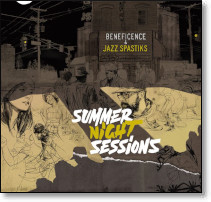 |
 |
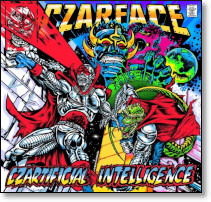 |
 |
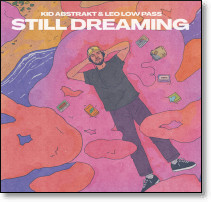 |
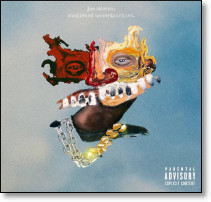 |
 |
 |
 |
Expanded blog post, January archive (in progress).
Tweet: Music Week: 53 albums, 8+1 A-list
Music: Current count 41584 [41531] rated (+53), 23 [21] unrated (+2).
Back on regular schedule after the holiday calendar confusion. The 18th Annual Francis Davis Jazz Critics Poll came out quickly on January 2. Article links at ArtsFuse:
- Francis Davis: The State of Our Union Could Be Better.
- Tom Hull: Rare Birds.
- Arts Remembrance: Jazz Notables We Lost in 2023.
The complete results and all 159 ballots are on my Jazz Poll Website.
After the fact, and not as part of the package, I wrote up a little Music Week: Jazz Poll blog piece. I offer a little bit of analysis there, not so much about the winning records but of the process of putting the Poll together. Obviously, I could have written a lot more, but I was frustrated by the lack of analysis tools. [PS: One mistake in that piece was citing Pyroclastic when I meant Tao Forms, for James Brandon Lewis's label. Both are small, artist-owned labels that extend significantly beyond their owner's albums, and in our Poll punch way over weight. Pyroclastic, whose ace publicist is Braithwaite & Katz, has 16 albums by 10 artists in our top-fifties. Tao Forms has 5 top-fifties by 3 artists, with two wins.]
But one bit of data I did manage to include is a list of albums that made my Jazz A-list (80 new and 22 old albums) but didn't show up on any of the voters' ballots: 16 new and 3 old. On the other hand, I calculated that, even after enjoying the advantage of seeing voters' ballots weeks in advance of their publication, and having logged grades for 865 jazz albums this year, I still hadn't heard 34% of the 535 new albums that got votes, or 39.8% of the old.
If/when I get time, I'd like to do some more analysis of the data. And, of course, I'd like to see what other people can do in terms of analyzing the data. At some point I hope to collect some of the mail and discussion based on the Poll. One thing I can point you to now is a Facebook post by Matt Merewitz (the publicist for the winning album), which I also collected notes from in my notebook.
Several people have offered to help, which I much appreciate -- although I haven't had time yet to figure out what help I most need. At this point, the things that would be most useful for me are to take a critical look at the website, especially the early years, and note where information needs to be improved (or in some cases, provided in the first place). Also, send me questions. I started to write a FAQ file, but it's always harder to think of questions than it is to answer them. I'm usually pretty diligent about working off assigned tasks, but I tend to flounder when I have to figure out what to do myself.
One thing I want to do more of is to compare our Poll against others. I haven't added much jazz data to my ever-growing EOY aggregate file, but will try to remedy that next week. In particular, I should then be able to generate a list of albums that appeared on other jazz lists but not on our ballots.
Meanwhile, one poll I want to mention here is one just published this week by the Spanish jazz magazine, El Intruso (which I voted in). Short on albums, with only a top five, and long on categories (instruments, groups, functions -- for them, with no pretense of significance, I just pick a few names off the top of my head, figuring they deserve mention, but of course so do many others). The top six albums (our finish in brackets):
- Steve Lehman & Orchestre National De Jazz, Ex Machina (Pi) 43 [3]
- Sylvie Courvoisier, Chimaera (Intakt) 40 [19]
- Jaimie Branch, Fly or Die Fly or Die Fly or Die ((world war)) (International Anthem) 30 [9]
- James Brandon Lewis/Red Lily Quintet, For Mahalia, With Love (TAO Forms) 27 [1]
- Darius Jones, fLuXkit Vancouver (i-t-s suite but sacred) (We Jazz Records/Northern Spy) 23 [15]
- Rodrigo Amado The Bridge, Beyond The Margins (Trost) 23 [24]
I often tack my grades onto lists like this one, but the only one here that didn't make my A-list was Jaimie Branch's, after two previous ones that did (perhaps one I should revisit?). Their poll tilts more toward European artists (two in the top six; the same two finished highest among Europeans in our poll, but at 19 and 24). That's no surprise, given that our share of American voters is still up around 80%, where theirs is a bit less than 40% (still a pretty large bloc). They also lean slightly more avant, although I can't say how much of that has to do with nationality as opposed to taste and interest.
Of El Intruso's 62 voters, 31 also voted in our poll; 7 more were invited but didn't respond; leaving 24 not invited (some I knew the names of but hadn't gotten around to vetting, and probably didn't have email for, plus a few more I wasn't even aware of). Given that their ballots and credentials are included in the poll, I should have studied harder.
I mentioned the EOY Aggregate file above. I've been trying to add specialized lists for hip-hop into it, as those records seem to be especially underrepresented in the lists collected by outfits like Album of the Year. By far the most useful list I've found is HHGA's The Best Hip Hop Albums of 2023. That send me looking for more than a dozen albums I was previously unaware of, eight of which I wound up adding to my Non-Jazz A-List just this week (stretching it out to 68 albums, still well short of the 80 on the Jazz A-List.
Although it seems like list-making season should be over now, there are still a lot of lists I haven't gotten to (current total: 238; last year: 565). No chance I will come close to 2022, but I have yet to factor in the Jazz Critics Poll (aggregate and most individual ballots), and while I've picked up some ballots from PJRP on the fly, I haven't yet made a systematic trawl through their feed. I also haven't counted sources like Ye Wei Blog, or Saving Country Music. Nor have I looked through the many international lists at Acclaimed Music Forums. I haven't even glanced at Uncle Fester yet (and may not, given how metal-heavy his lists are).
I'm torn right now because I have a lot of momentum toward wrapping up Music Year 2023, and readying the jazz poll for next year's round. On the other hand, I've resolved to spend the next month making a serious push toward writing the long-simmering political book. It's getting late to have any practical effect in 2024, and plenty of people will tell you that this is the year that will break democracy in America . . . if we don't rally and do lots of things to change people's minds. Those things seem clear enough in my mind to write without getting bogged down in research. So I figure I should give it a month, and see if what I come up with makes my friends think the effort is worth the trouble.
I've been pacing myself with my weekly Speaking of Which posts -- the first under that name dating to June 18, 2021, the latest yesterday (110 of them, with 561,232 words, but there are more similar pieces going back to the early days of the notebook, the political pieces collected into four Last Days book files: 2000-09 (766k words), 2009-2013 (768k), 2013-2017 (675k), 2017-2020 (651k), so I can look back on 3.4 million words. Reducing them to 60k would be a daunting amount of work, but remembering enough basic ideas to rattle off 30k from the top of my head should be easy. From that point, I could use some help checking facts, adding fine points, and tightening up the prose a bit, but there's reason to think that help might not be too hard to come by. Getting the thing started is, and has always been, the problem.
I won't start today, and I may not tomorrow -- it going to snow tonight, and I'm going to make meatloaf tomorrow -- plus I have some fairly urgent housekeeping chores I've been putting off. But sometime in the next week or so I am resolved to set out and start grinding down on it.
One more pretty major correction: in my review of Don Fiorino/Andy Haas: The Accidentals (from Dec. 4, 2023) I wrongly assumed that Jay Dee Daugherty was the same person as the late Bush Tetras and Radio I-Ching drummer Dee Pop. Daugherty, who appeared with Fiorino and Haas at a tribute for Dee Pop (Dimitri Papadopoulos), is very much alive.
New records reviewed this week:
- Alfa Mist: Variables (2023, Anti-): [sp]: B+(*)
- Beneficence & Jazz Spastiks: Summer Night Sessions (2023, Ill Adrenaline): [sp]: A
- Mykki Blanco: Postcards From Italia (2023, Transgressive, EP): [sp]: B+(*)
- Cautious Clay: Karpeh (2023, Blue Note): [sp]: B+(*)
- Chembo Corniel Quintet: Artistas, Músicos Y Poetas (2023, Chemboro): [sp]: B+(***)
- Chino XL & Stu Bangas: God's Carpenter (2023, Brutal Music/1332): [sp]: A-
- Czarface: Czartificial Intelligence (2023, Silver Age/Virgin): [sp]: A-
- Day Tripper: What a Time to Be Dead (2023, self-released): [sp]: B+(**)
- Elzhi x Oh No: Heavy Vibrato (2023, Nature Sounds): [sp]: A-
- Fatboi Sharif X Steel Tipped Dove: Decay (2023, Backwoodz Studioz): [sp]: B-
- Four Elements & Beyond: Clock the Chemistry (2023, Four Elements & Beyond): [sp]: B+(***)
- Derrick Gardner & the Jazz Prophets: Pan Africa (2022 [2023], Impact Jazz): [sp]: B+(***)
- Sam Gendel: Cookup (2023, Nonesuch): [sp]: B
- Nabihah Iqbal: Dreamer (2023, Ninja Tune): [sp]: B+(***)
- Kid Abstrakt & Leo Low Pass: Still Dreaming (2023, Melting Pot Music): [sp]: A-
- King Kashmere X Alecs DeLarge: The Album to End All Alien Abductions (2023, High Focus): [sp]: B+(*)
- Kool Keith & Real Bad Man: Serpent (2023, Real Bad Man): [sp]: B+(***)
- Madlib/Meyhem Lauren/DJ Muggs: Champagne for Breakfast (2023, Soul Assassins): [sp]: B+(***)
- Neak: Die Wurzel (2023, self-released): [sp]: B+(**)
- Ivan Neville: Touch My Soul (2023, The Funk Garage): [sp]: B+(**)
- Offset: Set It Off (2023, Motown): [sp]: B+(*)
- Dolly Parton: Rockstar (2023, Butterfly/Big Machine): [sp]: B
- Vinnie Paz: All Are Guests in the House of God (2023, Iron Tusk Music): [sp]: B+(**)
- Prins Emanuel: Diagonal Musik II (2023, Music for Dreams): [sp]: B+(**)
- Purelink: Signs (2023, Peak Oil): [sp]: B+(*)
- Quantic: Dancing While Falling (2023, Play It Again Sam): [sp]: B+(***)
- Raw Poetic: Away Back In (2023, Def Pressé): [sp]: B+(**)
- Recognize Ali: Back to Mecca II (2023, Greenfield Music): [sp]: B+(***)
- Jay Royale: Criminal Discourse (2023, self-released): [sp]: B+(**)
- Shabazz Palaces: Robed in Rareness (2023, Sub Pop, EP): [sp]: B+(*)
- Kavita Shah: Cape Verdean Blues (2023, Folkalist): [sp]: B+(***)
- Jae Skeese: Abolished Uncertainties (2023, Empire): [sp]: A-
- Jorja Smith: Falling or Flying (2023, FAMM): [sp]: B+(***)
- Cleo Sol: Heaven (2023, Forever Living Originals): [sp]: B+(*)
- Cleo Sol: Gold (2023, Forever Living Originals): [sp]: B+(**)
- Stik Figa X The Expert: Ritual (2023, Rucksack): [sp]: A-
- AJ Suede & Televangel: Parthian Shots (2023, Fake Four): [sp]: B+(*)
- Walter Wolfman Washington: Feel So at Home (2022 [2023], Tipitina's Record Club): [sp]: B+(*)
- Sam Wilkes: Driving (2023, Wilkes): [sp]: B+(*)
- Adrian Younge & Ali Shaheed Muhammad: Jazz Is Dead 16: Phil Ranelin & Wendell Harrison (2023, Jazz Is Dead): [sp]: B+(**)
Recent reissues, compilations, and vault discoveries:
- Cannonball Adderley Quintet: In Concert: Falkoner Centret, Copenhagen, Denmark, April 13, 1961 (1961 [2023], SteepleChase): [sp]: B+(***)
- Dorothy Ashby: With Strings Attached (1957-65 [2023], New Land): [r/yt]: B+(*)
- Danger Mouse & Jemini: Born Again (2003-04 [2023], Lex): [bc]: A-
- Evan Parker: NYC 1978 (1975 [2023], Relative Pitch): [sp]: B+(***)
Old music:
- Dorothy Ashby: The Jazz Harpist (1957, Regent): [yt]: B+(**)
- Dorothy Ashby With Frank Wess: Hip Harp (1958, Prestige): [r]: B
- Dorothy Ashby and Frank Wess: In a Minor Groove (1958, New Jazz): [r]: B
- Dorothy Ashby: Soft Winds: The Swinging Harp of Dorothy Ashby (1961, Jazzland): [yt]: B
- Dorothy Ashby: Dorothy Ashby (1962, Argo): [yt]: B+(**)
- Dorothy Ashby: The Jazz Harpist (1957-62 [2012], Fresh Sound, 3CD): [r/yt]: B+(*)
- Dorothy Ashby: The Fantastic Jazz Harp of Dorothy Ashby (1965, Atlantic): [yt]: B+(*)
- Dorothy Ashby: Afro-Harping (1968, Cadet): [sp]: B+(*)
- Dorothy Ashby: The Rubáiyát of Dorothy Ashby (1969-70 [1970], Cadet): [sp]: B
- Danger Mouse & Jemini: Ghetto Pop Life (2003, Lex): [sp]: B+(***)
Grade (or other) changes:
- James Brandon Lewis Red Lily Quintet: For Mahalia, With Love (2023, Tao Forms, 2CD): [cd]: [was: A-]: A
Unpacking: Found in the mail last week:
- Bill Anschell: Improbable Solutions (Origin) [01-19]
- Peter Erskine and the Jam Music Lab All-Stars: Bernstein in Vienna (Origin) [01-19]
Sunday, January 07, 2024
Speaking of Which
I didn't open this until Friday, when I wrote the introduction to the Israel section. I only got to collecting links on Saturday. Still, quite a bit here. The main reason for the late start was work wrapping up the 18th Annual Francis Davis Jazz Critics Poll, including this blog post, and a big chunk of time I spent documenting the discussion generated by Matt Merewitz's Facebook post.
I should also note here that after posting last week's Speaking of Which a day early, I went back and added a few more links and notes, marked with a red border stripe, like this paragraph.
Top story threads:
Israel: We speak of Israel's war against Gaza as genocide, because it fits the technical definition, and because genocide was formerly regarded as such an extraordinary crime as would compel other powers to intervene and stop. The classic model was what Nazi Germany did to European Jews during WWII -- the the discriminatory but less lethal period from 1933-39 now recognized as a precursor to genocide. But we've come to recognize other episodes of systematic killing and/or expulsion as other examples of genocide. (Some people like the term "ethnic cleansing" for expulsions, but the term first gained currency as used by Serbs in Bosnia, where it was plainly a euphemism for mass murder. I don't see any distinct value to the term, as the very idea of "cleansing" ethnics points to genocide.)
There can be no doubt that what Israel is doing in Gaza is genocide. (As for the West Bank, there is little difference between what Israelis are doing and what Nazi Germans did taking power in 1933, which doesn't necessarily mean that Kristallnacht, let alone Vernichtung, is coming, but certainly doesn't preclude it.) However, there is no precise word for what Israel is doing. The Germans had precise words to explain what they wanted: Lebensraum, Judenrein, Endlösung: they wanted land to settle, they insisted that no Jews could live there, and they meant this state to be final. What Israeli Nazis (I'd be open to a different term, but we routinely distinguish between Nazis and ordinary Germans, and that's precisely the distinction at work here) want in the West Bank is clearly articulated in the first two German terms (substituting Palestinians for Juden). But in Gaza they're moving straight to Final Solution, which they're willing to pay for even by giving up what has always been their prime directive: settlement (or Lebensraum).
There is a word for what Israel is doing, but it has rarely been used, and never by its practitioners: ecocide. Israel's goal (or to be more precise, the goal of the Israeli Nazis in power) is to make Gaza uninhabitable. If they succeed at that, they won't have to kill every Gazan. The land will be free of Palestinians, and Israel will have reasserted its Iron Wall. This shouldn't be much of a surprise. The catchphrase we've been hearing for decades was "facts on the ground." This was the motto of the post-1967 settlement movement in the West Bank: to establish "facts" that would make it politically impossible to undo. So while Israeli and American diplomats talked, in increasingly ridiculous terms, of "two-state solutions," Israeli policy was making any such thing impossible. And so, today, diplomats and pundits talk of postwar schemes for containing Gazans in their rapidly demolished surroundings, Israel is making life impossible, and irrecoverable.
The closest thing I can think of to an historical analogy is Sherman's efforts to exterminate the bison on the Great Plains. As a result, many Plains Indians starved, but more importantly the survivors realized that they couldn't sustain the way of life they had enjoyed when the buffalo roamed, so they gave up, trudged into the concentration camps the government set up for them as reservations, while settlers turned the vast grazing lands into farms. When Israelis spoke of their desire to turn Palestinians into "an utterly defeated people," I always thought back to the Plains Indians.
I also noted that at some point the US became satisfied with its Lebensraum, and realized that they didn't have to exterminate the last Indians, who in any case had started to adapt to their changed reality. The Final Solution turned out to be liberal democracy -- a stage that Israel is far from realizing, and may never given demographics and psychology. Indeed, any other "solution" would have failed, as Israeli history is repeatedly showing us.
This week's links:
AP: [01-05] UN warns Gaza is now 'uninhabitable' as war continues: "Humanitarian chief fears 'famine is around the corner' with 85% of population displaced and more than 20,000 dead."
Mondoweiss:
[01-01] Day 87: As millions around the world rally for peace, an Israeli minister calls for ethnic cleansing.
[01-02] Day 88: Israeli army kills 4,000 students in Gaza, detains hundreds in torture camps.
[01-03] Day 89: Hamas and Hezbollah pledge to punish Israel following Aruri killing.
[01-04] Day 90: Hezbollah says the killing of al-Aruri will not go unpunished.
[01-05] Day 91: As hunger and cold take their toll in Gaza, all eyes turn to Lebanon.
[01-07] Day 93: Israel surpasses three months of Gaza bombing campaign, UN warns of starvation.
MEE Staff:
[12-29] Former Israeli Prime Minister Naftali Bennett calls on US to bring down Iran: "In the Wall Street Journal op-ed, the former leader also admits Israel was behind an assassination and sabotage operations in Iran."
[01-03] Israel mulls hiring Alan Dershowitz to represent country in ICJ genocide case.
[01-06] Heavy exchange of fire across Israel-Lebanon border, as Gaza toll climbs.
Yuval Abraham: [01-05] Inside Israel's torture camp for Gaza detainees.
Ahmed Al-Sammak/Elis Gjevori: [12-26] Netanyahu looking for countries 'to absorb' ethnically cleansed Palestinians: There are several reports like this. They remind me that before started building extermination camps, they floated the idea of expelling Jews to Madagascar (then a Vichy French colony, but still "impractical" -- and probably not "final" enough).
MEE Staff: [01-05] Israel 'in talks with Rwanda and Chad' to exile Palestinians.
Paul Woodward: Ethnic cleansing: Israel in talks with Congo and other countries on Gaza 'voluntary' migration plan: Cites Times of Israel and Al Jazeera reports.
Ruwaida Kamal Amer: [01-04] In Gaza 'safe zone,' Palestinians are living out their nightmares.
Zack Beauchamp: [01-03] Israel's Supreme Court just overturned Netanyahu's pre-war power grab.
Jason Burke: [01-02] Saleh al-Arouri: assassinated leader was Hamas's link to Iran and Hezbollah. "Most recently, Arouri played a role in talks brokered by Qatar, which led tot he release of some of the 240 hostages taken by Hamas."
Isaac Chotiner: [01-03] Gaza is starving: Interview with chief economist of the World Food Program, Arif Husain.
Stanley L Cohen: [01-05] Guilty as charged: A New York City lawyer looks at the the laws governing genocide and war crimes.
Alain Gabon: [01-02] Israel's eight methods of genocide.
Tareq S Hajjaj: [01-06] The new Nakba generation enters a new year in Gaza: "Israel's genocidal war of expulsion is nothing like the people of Gaza have ever seen -- not this generation, not their parents' generation, and not the generation that survived the Nakba."
Ibtisam Mahdi: [12-20] Gaza's health crisis 'catastrophic,' say Palestinian experts.
Nicola Perugini: [01-06] Safe zones: Israel's technologies of genocide: "The designation of safe area in Gaza allows the Israeli army to carry out war crimes more efficiently and then to deny them."
Meron Rapoport: [01-02] The 'second Nakba' government seizes its moment: "Israeli leaders are explicit about reusing the methods of 1948 in Gaza today."
Matt Shuham: [01-04] Israeli officials' calls for 'voluntary' migration of Palestinians alarm human rights experts.
Richard Silverstein:
[01-01] US rejected Palestinian deal that would have avoided 10/7.
[01-03] Security source confirms Israel assassinated al-Arouri.
[01-05] Why Hamas might have already won: I don't care for this style of argument, in large part because I never see winners in war, no matter how contented a side is with the damage meted out. The Oct. 7 Hamas attack was inexcusable, except retroactively by Israel proving that Hamas's desperation was warranted. Still, such vindication is hardly a win. It's really a massive loss for both sides. This piece led me to David Hearst: [12-22] Netanyahu wanted to 'collapse' Hamas. This war could collapse Israel: "The Gaza war has been a huge miscalculation for Israel. As well as being a moral and military disaster, it is fuelling resistance and reigniting the embers of anger across the Arab world." Well, not just there.
Philip Weiss:
[12-31] Weekly Briefing: At year's end, Israel's dead end: "Israel has no vision. It appears now to want world war as a fix to its core problem -- that Palestinians have no rights."
[12-03] Advocating one person/one vote for Israel is antisemitic -- 'Forward' editor: "Judy Rudoren, the editor of the Forward, offers a frank rationale for Zionism, stating that it is opposed to equal rights in the American tradition."
[12-07] Weekly Briefing: Claudine Gay was brought down by the Israel lobby.
Robert Wright: [01-05] Israel's ethnic cleansing push. Wright cited this piece in a tweet, "If anyone tells you Biden doesn't have the leverage to wind down the Gaza war before it turns into a regional conflagration, read them this quote":
Israeli Major General Yitzhak Brick was quoted recently in Mother Jones as saying, "All our missiles, the ammunition, the precision-guided bombs, all the airplanes and bombs, it's all from the US. The minute they turn off the tap, you can't keep fighting . . . Everyone understands that we can't fight this war without the United States. Period."
Seth Ackerman: [01-04] There was an Iron Wall in Gaza: "Addicted to territorial aggrandizement and encircled by enemies of its own making, Israel has freed itself of all moral constraints." This is a fairly long historical piece, basic stuff to understand what's been going on for decades. Meanwhile, for today:
Israel, America, and the search for a larger war in the Middle East:
Erin Banco/Lara Seligman/Alexander Ward: [01-04] The war in Gaza may widen. The Biden admin is getting ready for it. But note: "a Quinnipiac poll in November showed that 84 percent of Americans were either very or somewhat concerned that the U.S. would be drawn into the Middle East conflict. And with each passing month, more and more Americans fear the Biden administration is offering too much material support to Ukraine."
Ramzy Baroud: [01-05] Rage over Gaza: Washington will pay for its support of Israel.
Oliver Eagleton: [01-05] Joe Biden's unconditional support for Israel risks creating a regional war. Biden's desire to be seen as backing Israel let him be suckered into sending forces into the Mediterranean and Red Sea, in addition to the troops already in Iraq and Syria, on the theory that they would deter others from attacking Israel. What they did was to give Israel cover for striking Lebanon, Syria, and Iran. If they manage to draw the US into war with them, that will give Israel further coverage for genocide in Gaza.
Connor Echols:
[01-02] Israel kills Hamas leader in Beirut, fueling escalation fears.
[01-03] Bombing of Soleimani mourners in Iran kills over 100 people: "The attack is the latest indication that the Gaza war could become a regional conflict at a moment's notice."
Tanya Goudsouzian:
[01-02] Iraq can't hold off Gaza's spillover much longer: "Prime Minister Al-Sudani's balancing act between the US, Iran, and a pro-Palestinian public can break at any moment."
[01-05] Iraqis: Don't use our country as a 'proxy battleground': "US strikes in Baghdad that killed an Iraqi militia leader are testing the fragile relationship."
Ellen Ioanes: [01-06] What Houthi attacks in the Red Sea mean for global shipping -- and conflict.
James North: [12-30] Israel is provoking the U.S. into a conflict with Iran -- but the media ignores the danger: "In addition to killing thousands of Palestinians in Gaza, Israel has been routinely attacking at least four other nations in the region: Iran, Yemen, Syria, and Lebanon."
Trita Parsi: [01-03] Will Israel drag the US into another ruinous war? "Biden refuses to pursue the most obvious way of de-escalating tensions and avoid American deaths: a cease-fire in Gaza."
Paul R Pillar: [01-03] Israelis step up assassination tactics outside Gaza: "Killings at the center of Iran-supported militant groups in Lebanon and Syria may force a 'wider war' everyone says they don't want."
Mitchell Plitnick: [01-06] The U.S. can't blindly support Israel and prevent escalation in the region at the same time.
Mustafa Salim/Louisa Loveluck/Dan Lamothe/Alex Horton: [01-04] U.S. strike in Baghdad raises specter of wider regional war: "Iraq says the strike violated agreements between Baghdad and Washington."
David Sylvan: [01-02] Washington's Gaza kabuki: "Professions of concern about the war's destruction are unlikely to be translated into real pressure on Israel."
Israel, genocide, and conscience around the world: Israel is not just fighting Palestinians. They're also, with American help, waging a propaganda war around the world, not just against sympathy for Palestine but against the possibility that people around the world will develop a conscience and try to hold Israel accountable.
Joe Allen: [01-04] A new anti-war movement emerges in America. Picture is a sign: "You fucked with the wrong generation."
Michael Arria:
[01-04] The Shift: Gay resigns, Biden official quits. The Biden official was Tariq Habash, who worked in the Dept. of Education. More on Gay below.
[01-05] Crackdown on Palestine in education goes far beyond universities.
M Reza Benham: [01-04] Palestine: The greatest moral issue of our time.
Jessica Corbett: [01-03] Bernie Sanders: No more US money for "grossly disproportionate" Israeli war on Gaza.
Alaa Hachem/Oona A Hathaway: [01-04] The promise and risk of South Africa's case against Israel.
Ellen Ioanes: [12-31] South Africa's genocide case against Israel, explained.
John J Mearsheimer: [01-04] Genocide in Gaza: On the South African ICJ charge.
Benjamin Moser: [01-02] Anti-Zionism isn't the same as antisemitism. Here's the history.
Michelle Weinroth: [01-07] Why we have to make the Jewish Ghetto comparison.
Other statements:
Trump, and other Republicans:
Isaac Arnsdorf/Marianne LeVine: [01-06] Trump tries reappropriating 'insurrection' on Jan. 6 anniversary.
Michael Bader: [01-02] Poor, pitiful conservatives: How the right's counterfeit victimhood narratives harm us all.
Zack Beauchamp: [01-02] How death threats get Republicans to fall in line behind Trump: "The insidious way violence is changing American politics -- and shaping the 2024 election."
Michael C Bender/Lisa Lerer/Michael Gold: [01-06] Trump signals an election year full of falsehoods on Jan. 6 and democracy.
Jamelle Bouie:
David Dayen: [01-05] Republicans don't want to win an immigration policy fight: "They just want to sustain the image of an immigration crisis."
Melvin Goodman: [01-05] The commonality of megalomania: About Trump, and some other guy.
Ed Kilgore: [01-06] How Republicans learned to love January 6.
Althea Legaspi: [01-06] Trump says Civil War could have been 'negotiated' in bizarre Iowa speech.
Charisma Madarang: [01-05] Trump on Iowa school shooting: 'get over it': "comments come a day after a gunman killed a sixth grade student and wounded five other people at Perry High School."
Amanda Marcotte: [01-05] Jan. 6 was bound to be celebrated by Republicans -- it was only a matter of time.
Harold Meyerson: [11-27] The blueprint: "The far right has a plan to remake America. They even wrote it down." I've noted "Project 2025" before, but somehow missed this important piece.
Molly Olmstead: [01-06] The radical evangelicals who helped push Jan. 6 to wa ge war on "demonic influence": "Mike Johnson has deep ties to groups that encouraged the Capitol raid -- out of conviction that they're in a literal battle between supernatural forces of good and evil. Interview with André Gagné, author of American Evangelicals for Trump: Dominion, Spiritual Warfare, and the End Times.
Charles P Pierce:
[12-28] Lauren Boebert is runnin' scared: "Behold, a belligerent yahoo sprinting away from the Democrat she just barely beat last time." For more:
- Ryan Biller: [01-07] 'We don't want to be a national laughingstock': How Lauren Boebert blew her safe seat.
[01-05] Okay, can we care about the emoluments clause now? "The minority of the House Oversight Committee just released a 156-page report on exactly how the former president put his office up for sale."
Jacqueline Alemany: [01-04] Trump businesses received $7.8 million in foreign payments during presidency.
Tatyana Tandanpolie: [01-04] "White House for sale:": Report reveals Trump made over $6M from China and Saudi Arabia in office.
Jeremy Schulman: [01-06] Trump's own appointees will decide if he stays on the ballot. That's a good thing. "If the ex-president is disqualified from office, it will be because at least one of the justices he nominated votes to do it."
Benjamin Wallace-Wells: [01-07] How Trump captured Iowa's religious right.
No More Mister Nice Blog: [01-07] Would Trumpism have happened even without Trump? This starts with "an interesting question" from Ross Douthat, which I won't bother you with (hint: not that interesting, and probably not at all by the time Douthat gets done with it), but I felt like quoting this comment:
I think I know why right-wing populism is thriving. It's fairly simple: Moneyed interests worldwide don't want to cede any more of their ill-gotten gains than they do now, and they have power -- especially in America -- to prevent any additional wealth transfers to the have-nots. That means liberalism always disappoints voters, whose material circumstances are never allowed to improve. Right-wing politicians don't even bother trying to improve the lives of ordinary people, but right-wing populists at least know how to create liberal and left-wing scapegoats for the public to hate. For many voters, watching a right-wing populist treat, say, immigrant asylum seekers or LGBTQ people cruelly feels like at least some kind of victory. It's more than liberals can offer as long as the plutocracy always has the final say.
I'd take the next paragraph in a slightly different direction, but the idea that Democrats can implement necessary reforms while still catering to the super-rich has clearly been tried, and found wanting. Democrats have to deliver concrete results, and where they fail, they need to clearly assign blame, which means they have to start shaming the moneyed interests, even the ones whose checks they seek. So in the end, sure, "confront the superwealthy directly," but make sure the message is clear.
I also recommend this blog piece: [01-05] Don't be afraid to insult the Republican Party, Democrats. And for an example: [01-05] There are no mainstream Republicans: On Nikki Haley and her endorsement by Don Bolduc.
Biden and/or the Democrats:
Edward-Isaac Dovere: [01-02] How the Biden campaign hopes to make 2024 less about Biden and more about a contrast with Trump. The worst part of this strategy is the temptation to try to drive a wedge between Trump and supposedly less extreme Republicans (like Nikki Haley?). There is no practical difference. Forget about Trump and Biden for the moment. Democrats do much better in generic polls than when they're represented by Biden, in large part because people understand that Republicans are worse. Campaign on that. The only downside is realizing that Biden is dead weight, dragging the whole ticket down.
Noah Lanard: [12-22] How Joe Biden became America's top Israel hawk: "The president once said 'Israel could get into a fistfight with this country and we'd still defend' it. That is now clearer than ever."
Ruy Teixeira: [01-03] How did we get stuck with Biden and Trump again? I should read this more carefully, and maybe even read the book he wrote with John B Judis (Where Have All the Democrats Gone? -- on my proverbial bedstand), but I'm suddenly gobsmacked by the bio line: what kind of Democrat cashes checks from the American Enterprise Institute?
Michael Tomasky: [01-05] Americans don't care about democracy? Well, Democrats -- make them care: "What Biden needs to tell American voters today -- and every day until the election." Actually, Democrats need to do more than lecture Americans on their civic duty. They need to show the people that democracy serves them, and not the special interests (which most of them spend most of their time pursuing).
Legal matters and other crimes:
Ian Millhiser:
[01-03] The Fifth Circuit just made it even more dangerous to be pregnant in a red state: "The Trumpiest court in America just tried to neutralize a federal law requiring most hospitals to provide medically necessary abortions."
[01-05] The Supreme Court's new, nightmare abortion cases, explained.
[01-05] The Supreme Court arguments for (and against) removing Trump from the ballot, explained.
Climate and environment:
Charles P Pierce: [01-04] You're going to want to remember the name 'Willow Project': "The potential for environmental damage from this drilling project goes beyond fossil fuels."
Maanvi Singh: [01-03] A tearful farewell to the 21 species we declared extinct in 2023.
Economic matters:
Eric Blanc/Alex N Press: [01-05] The US labor movement had a banner year in 2023.
Joseph E Stiglitz: [01-04] Time for a victory lap? "Those who believed inflation would be transitory were proven right, and those who demanded the sacrifice of mass unemployment proven wrong."
Ukraine War:
Connor Echols: [01-05] Diplomacy Watch: Ukraine aid officially runs out.
Anatol Lieven: [01-04] Ukraine facing increasingly unfavorable odds: "As the war drags on, the Russians will slowly gain advantages and reduce any leverage Kyiv may have in peace talks."
Around the world:
Toby Helm: [12-30] Brexit has completely failed for UK, say clear majority of Britons. Just 22% say Brexit has been good for "UK in general," but it polls even worse for every one of nine specific questions.
Joshua Keating: [01-06] Why Taiwan is 2024's first big election to watch.
Other stories:
AP: [01-05] Boeing still hasn't fixed this problem on Max jets, so it's asking for an exemption to safety rules. Then, a day later, there's this coincidence:
Jeff Wise: [01-06] Alaska Airlines inflight blowout raises new doubts about 737 MAX. Branch Rickey used to say that "luck is the residue of design." So, surely, is bad luck, the residue of bad design, sloppy execution, a mentality that never looks beyond the bottom line, and an arrogance that thinks nothing else matters.
Dave Barry: [01-01] 2023 in review: Or, as the title appeared in my local paper: "2023 was the year that AI and pickleball came for humanity."
Fabiola Cineas: [01-05] The culture war came for Claudine Gay -- and isn't done yet: "Harvard's former president is just one target in the conservative uproar over higher education." Also:
Adam Gabbatt: [01-03] 'A bully': The billionaire who led calls for Claudine Gay's Harvard exit: Bill Ackman.
Aaryan Morrison: [01-04] On white supremacy and Zionism: a reflection on Claudine Gay's tenure as president of Harvard University.
Jon Schwarz: Let's seize this opportunity to destroy Harvard! "After that, progressives should extirpate the entire Ivy League." Right-wingers may see Harvard as a bastion of the left, a view not shared by many real leftists.
Christopher Sprigman: [01-07] Neri Oxman and Claudine Gay cases show we need new rules on plagiarism. Like, maybe, who cares? I recall a story about a semi-famous programmer having a placcard on his desk saying something like "any idea worth having is worth stealing." Everything creative comes from other sources, some conscious, some not. Even Newton "stood on the shoulders of giants." If he didn't quote and footnote them properly, was he a fraud? You can't steal something that's not property. Do we really want every idea, every sequence of words or notes, to belong to other people, to monetize and collect rent on? According to some laws, I guess we do, but really, should we?
Jeffrey St Clair: [01-05] Roaming Charges: Let the (far) right ones in: Leads off with the Harvard/Claudine Gay story, roaming afterwards.
Rachel M Cohen: [12-29] Why treatments for severe mental illness looks radically different for rich and poor people: "And a new way to understand cities' response to tent encampments." Interview with Neil Gong, author of Sons, Daughters, and Sidewalk Psychotics: Mental Illness and Homelessness in Los Angeles.
Sheon Han: [01-05] What we lost when Twitter became X: "As former Twitter employee, I watched Elon Musk undermine one of the Internet's most paradoxical, special places."
Sarah Jones: [01-04] Who gets to be a person? By the way, she's become my favorite columnist of the past year, so let me remind you of a few of her pieces:
- [04-08] Children are not property: The idea that underlies the right-wing campaign for "parents' rights."
- [05-16] The sheepdog defense: A killer's military service endears him to the right-wing.
- [05-30] A generation moves on: Right-wing indoctrination is heady, but it doesn't always stick.
- [06-11] What the Censors want: Book bans imagine a world without progress or challenge.
- [08-25] What is a university without liberal arts? Proposed cuts at West Virginia University may portend a dark future for higher education everywhere.
- [10-19] The Palestinian blood on America's hands: Unconditional support for Israel's war devalues innocent lives in Gaza.
- [11-02] Republicans for war crimes: Eliminationist rhetoric from conservatives meets cowardice from Democrats.
- [11-10] Listen to the dissenters on Israel: Black-check support for the war in Gaza will only further debase America's reputation.
- [12-14] The anti-abortion movement is anti-human
- [01-02] Hypocrisy isn't the problem with the parental-rights movement: Scandals involving alcohol for teens and a threesome reveal what the leaders truly want.
Fred Kaplan: [01-05] Nostalgia for Cold War diplomacy is a trap: "Compared with the international problems of today, post-World War II diplomats had it easy." Responds to an article in Foreign Affairs, which given that foreign policy wonkery is a reserve for elites is beyond my budget -- the piece is Philip Zelikow: The atrophy of American statecraft: How to restore capacity for an age of crisis -- I can't fully engage in. I will note one aspect of Cold War diplomacy that I am nostalgic for: mutual fear that even small conflicts could escalate into world war (as, e.g., happened after an assassination in Sarajevo in 1914) led the US and USSR to force ceasefires urgently, as happened with Israel's wars in 1967 and 1973. Since the Soviet Union dissolved in 1991, the US has never shown any urgency in ending conflicts, because that fear of escalation has been lost, and more fundamentally because the US is increasingly in the business of intimidation and escalation, and as such has set the model for other nations -- above all our supposed enemies -- to follow. The irony is that peace has never been more urgent, because the world has become ever more complex, interdependent, and fragile.
Kaplan quite rightly points out that the Cold War diplomats were pretty fallible. I would also add that they enjoyed two big advantages over current diplomats: after WWII, America was very rich, compared to the rest of the (largely devastated) world, so could afford to be generous in its dealings; and the US enjoyed a great deal of good will, largely because the US was not viewed as an aggressor in the World Wars, and had a relatively small and benign imperialist footprint. Both of those advantages dissipated over time -- especially the latter, as American bases, arms, and banks replaced colonial with capitalist exploitation.
Still, the sorry decline of American diplomacy since 1990 isn't a mere function of declining advantages and increasingly complex terrain. A toll is also being taken by arrogance, greed, special interests, domestic political calculations, the persistence of myths (many dressing up plain stupidity), disregard for justice (partly due to increasing inequality in America), and sheer pettiness. One could (and someone should) write a book on these mistakes. It is hard to think of any other area of public policy where so many ostensibly smart people have been so wrong for so long with such disastrous consequences, yet they continue to be celebrated in the annals of elite publications like Foreign Policy. (Need I even mention Henry Kissinger?)
Doug Muir: [01-06] The Kosovo War, 25 years later: First of a promised series of three posts.
Rick Perlstein: [01-03] You are entering the infernal triangle: "Authoritarian Republicans, ineffectual Democrats, and a clueless media." The former is what it is, but we rarely examine it critically, or even honestly. Much of the blame for looking away lies with the latter two, for which the author gives numerous examples. Argues that "all three sides of the triangle must be broken in order to preserve our republic, whichever candidate happens to get the most votes in the 2024 Electoral College."
Nikki McCann Ramirez/Tim Dickinson: [01-05] Longtime NRA chief resigns ahead of corruption trial: Wayne LaPierre.
Clay Risen: [01-06] Arno J. Mayer, unorthodox historian of Europe's crises, dies at 97: "A Jewish refugee from the Nazis, he argued that World War I, World War II and the Holocaust were all part of a "second Thirty Years' War." A little late -- I've cited pieces on the late historian two previous weeks running -- but does a good job of defending his "nuanced" view of the Nazi Judeocide and his disillusionment with Israel, both of special relevance today.
Paul Rosenberg: [01-01] Project Censored top 10 stories: Corporate abuse and environmental harm dominate: "The pattern signals a deeper truth about economics and human survival." Fyi, let's list these:
- "Forever chemicals" in rainwater a global threat to human health
- Hiring of former CIA employees and ex-Israeli agents "blurs line" between big tech and big brother
- Toxic chemicals continue to go unregulated in the United States
- Stalkerware could be used to incriminate people violating abortion bans
- Certified rainforest carbon offsets mostly "worthless"
- Unions won more than 70 percent of their elections in 2022, and their victories are being driven by workers of color
- Fossil fuel investors sue governments to block climate regulations
- Proximity to oil and gas extraction sites linked to maternal health risks and childhood leukemia
- Deadly decade for environmental activists
- Corporate profits hit record high as top 0.1% earnings and Wall Street bonuses skyrocket
Dean Spears: The world's population may peak in your lifetime. What happens next? Argues that world population will peak with six decades, then lead to a precipitous depopulation, which is supposed to be some kind of problem -- one in need of "a compassionate, factual and fair conversation about how to respond to depopulation and how to share the burdens of creating each future generation." People who worry about such things worry me.
Emily Stewart: [01-04] You don't need everything you want: "Our expectations around money are all out of whack." Pull quote: "There is nowhere you can look in society that isn't screaming at us to spend, spend, spend."
Friday, January 05, 2024
Jazz Critics Poll Discussion
Long Facebook comment by Matt Merewitz on the Poll [link]:
I am proud to have contributed my professional efforts to projects that seem to have some critical consensus around them (and after all, are profound works of art, in an age where most people do not appreciate the album as an artform anymore) like James Brandon Lewis' "For Mahalia, With Love" and Myra Melford's Fire & Water Quintet's "Hear The Light Singing" among several other clients and friends (Art Ensemble of Chicago, Rudy Royston, Todd Sickafoose, Linda May Han Oh, Darcy James Argue Aaron Diehl, Darius Jones, Ambrose Akinmusire, Allison Miller, Cecile McLorin Salvant, Steve Lehman, etc.). I do find it a bit troubling however that certain recordings that I feel were truly amazing that I listened to over and over (Simon Moullier, Adam Birnbaum, Michael Blake, Brad Mehldau, Roxana Amed/Frank Carlberg, Naya Baaz, Charles Owens, Kassa Overall, Jo Lawry) seem to have engendered almost no critical love at year-end and that is the inherent problem with lists composed of 10 records or of the methodology of the Francis Davis/Tom Hull Poll with the ranked points system. I've said it before but there is implicit critical bias in these lists where those voting clearly prefer or prioritize more avant garde work. However this year's top 20 does recognize a few more populist efforts than in past years and admittedly none of the top 20 are that "out." Greater attempts need to be made by the poll's (unpaid and unappreciated) organizers to broaden the tent of participants; including to badger non-responders (those who are invited to vote, but don't or don't reply on time). Or maybe the whole enterprise is futile. I dunno. I think we can all agree that we deserve more thoughtful accompanying essays than what we were offered this year. But that's what no money supporting music criticism buys us. For those types of lists or commentary, I would direct you to recent Substack posts by Nate Chinen (The Gig), Peter Margasak (Nowhere Street), Tom Moon (EchoLocator), and blog posts by other unpaid enthusiast-scholars like Dr. Mark Lommano. Also columns by folks like Carl Wilson or Fred Kaplan, ironically both in Slate offered a more nuanced take on things. Congrats to everyone who put themselves out there with new music of any stripe in the last year. It is incredibly hard, often unrewarding work.
Rob Shepherd commented:
To provide a counter argument to that, part of it has to do with the fact there's often more innovation with the avant-garde. What do you think will generate a more passionate response in a writer who has to find ways to turn what they hear into words? Album A where the highlight is the 20 millionth straight ahead version of "Footprints" but with some killer solos or Album B which is, say Steve Lehman's latest where he's experimenting with AI and spectral harmony. There is so much more to write about with album B and it shouldn't be surprising that the critics want to write about it more. Even if A had a lot of great original compositions but they all sound similar to music that came before, B would still be more interesting to write about.
That's not to say there aren't any more straight-ahead albums that deserve more recognition - there certainly are - but they come from a starting point of being less compelling to most writers. And ultimately, it is how compelling the writer finds the work that dictates how it gets ranked.
Many more comments worth mentioning. Here's one from Ludovico Granvassu:
Let's introduce another angle: 50 albums on the list Matt shared [the top-fifty poll albums, as published by ArtsFuse]. If my math is correct: there's only 4 albums by bands from outside the US. Plus 3 non-US musicians who are based in NYC. Keeping the focus to the US: only one band from Chicago? No albums from the vibrant LA scene? The polls are interesting insights not just on what great music is being released (because those 50 albums are of very high level) but of how much great music does not even make it to the desks/ears of so many (and if it doesn't make it to the ears of those who devote so much of their time to parsing what the scene has to offer . . . what are the chances it makes it to the ears of everyday fans/record buyers?). And yes, NYC remains a fundamental piece of the jazz ecosystem, but in the aggregate there's way more jazz being produced and released in the rest of the world than in NYC. What does this mean at the end of the day? That a jazz fan who lives in NYC has a much smaller choice/access than one that lives in Tokyo, or Berlin . . . it's too expensive for a foreign musician to tour here, the radio does not play foreign musicians, their albums don't make end of the year lists . . . whereas in Japan or Germany (just to randomly pick two countries) - through local venues/record stores/radio/magazines - jazz fans get exposed to both US jazz (because it cannot but be that way) and jazz from everywhere else.
Merewitz responded to Granvassu:
I have repeatedly given European and Japanese in Australian names to the organizers and they have said that they don't respond to him. Maybe you and I should create a true international critics poll of TODAY. We welcome collaborators.
Bret Sjerven commented:
Interesting . . . . I don't think the divide is anything new. Just check the Critics Poll vs. the Readers Poll in DownBeat. The critical hive mind has seems to always skew toward the creative rather than the more widely accessible. This is important. The public needs to know there are options beyond what they hear on WBGO. I do think there are limits there but it has always been the way that the music advances and widens its scope. It just so happens that the musicians who can bridge the gap tend to have better careers. Seems to me that some of the more wooly of the creative composers/performers who broke in on the wave experimental are trying more palatable music and are getting their just rewards.
Andrea Wolper commented:
I so appreciate the thoughtfulness of this post, Matt. There's a lot to unpack, as the saying goes. Yes, the writers' polls seem to favor the more "avant garde," and it's always been interesting to me that, as Bret Sjerven put it, "The critical hive mind seems to always skew toward the creative rather than the more widely accessible," though (a) while I get it, I take some issue with how we've come to use the word "creative," and (b) hive mind!--no matter which part of the jazz spectrum anyone favors, people are influenced by trends, popularity, etc.
Rob Shepherd's point that innovation "will generate a more passionate response in a writer" makes sense, though (a) I agree with you, Matt, that there's a whole lot of music between his examples A & B and (b) let's be honest: not everything we put in the "avant" or "out" or "creative" bin is in fact innovative. There are artists across the gamut from the most straight ahead to the most experimental who haven't figured out what is uniquely theirs to say. Yes, this is a life's work, but consider someone like Jay Clayton--much on my mind now for obvious reasons--who had a powerful identity out of the box, and just grew and grew from there. I'm not at all convinced that the combination of individuality, communication, and skill is any more certain to be present in more "innovative" music than it is to be absent in the 20 millionth version of "Footprints." Mediocrity, brilliance, and everything in between can be heard all across the spectrum.
Mark Lomanno noted (I've spent a lot of time thinking about this):
I'm still hoping for some sort of central database for releases. I know it's a pipedream but, to your point, I spend a lot of time trying to find records in hopes of not missing much and there always seem to be a lot that slips through the cracks. There's a lot of labor and time spent for discovering the records that could be redirected to listening and writing.
Merewitz replied:
Tom Hull's website is a freakishly good place to start. He tallies them all year by genre and does not just listen to jazz.
Merewitz also replied to a thing about Wire contributors:
a good question is why aren't the poll organizers soliciting lists from all your jazz contributors. Granted they have Phil, Stewart, Bill and maybe Peter but there are others for sure!
Noah Baerman:
The most sobering part to me is simply the juxtaposition of increasing glut of "product" and decreasing outlets that discuss it all. I am as thorough and systematic as I can be (especially as an "unpaid" listener/shiner-of-lights) and find myself constantly finding things that had gone under my radar even though they're beautiful and represented the artist's whole heart (and often whole wallet).
I don't know which is more sobering in the grander scheme of the ecosystem - a great new record by an "obscure" artist that is amazing but ignored or a great new record by a "name" artist that would've gotten major buzz 20-30 years ago but makes only a small and momentary blip on the radar of public consciousness.
Also, the subject of publicists came up, to which Merewitz added:
I want to acknowledge my colleagues in this endeavor: Lydia Liebman, Ann Braithwaite, Seth Douglas Rosner, Jason Byrne, Jesse Cutler, Don Lucoff, Jon Solomon, Carolyn McClair, Kim Smith, Daniela Siemon, Terri Hinte, Melissa Cusick Weiss, Chris Taillie, Brett Loeb, Jacob Daneman, Sam McCallister, Judy Miller Silverman, Kevin Calabro, Damien Besançon, Cary Goldberg, Chris Digirolamo and many more!
I finally wrote a series of comments:
I want to express my gratitude and delight at seeing so much really intelligent discussion of our Poll. This has stimulated many thoughts in me, which I can only begin to hint at here. But first I should mention that after the official files got sent off to ArtsFuse, I wrote a blog piece on the Poll, which at least starts to address some of the questions about what kind of records do well in the Poll, and why it's really important that the lists don't stop at 10 or 50. It occurs to me that I should write a postscript to address these and a few more points there (I'm interrupting many other things I need to do, so don't expect it right away, but I will add a couple more comments here, while they're still fresh). The blog post link.
A lot of questions have to do with the composition of the Poll. I invited about 210 people to vote in 2022, and got 151 ballots. Nearly all of those people had voted in previous polls, so were vetted by Francis Davis. I invited about 240 people this year, and got 159 ballots. Something like 20 of those invited responded and declined, for a wide range of reasons (aside from health, the biggest chunk came from former JazzTimes writers). Some of the rest probably didn't get email (bad addresses, or overvigilant spam traps), or deleted it without reading it, but most simply ignored it. Some of these comments imply that we're omniscient but engaged in devious rigging of the vote. We (for 2023 I probably should switch to I, as Davis had no real involvement in the invitation process this year) have very little time or energy for identifying, vetting, and tracking down possible voters, so much of the composition comes down to luck. Of the writers Merewitz mentions, all voted except for: Tom Moon was invited but didn't respond; I didn't think to invite Carl Wilson, even after logging his Slate piece in my EOY aggregate (I see that he mentioned 7 jazz albums, but only 2 in his top tier). As an old-time rock critic myself, I've invited several similar critics (as had Davis before me). As for the Wire writers, tell me who we need to invite. I did make an effort to get more European critics this year. I also added voters from Chicago and New Orleans, but the effect of these changes is mostly to add more records on the fringes, not to tilt the consensus.
- I rather doubt that the structure of the Poll makes much difference, especially given the large number of voters. I prefer the logic of using P&J-type points, but don't relish the extra work, and it would also be more trouble (or at least confusion) for the voters, which we don't want. Allowing for longer lists would also mean a lot more work, but at least it would be more fun, and generate more information. It would greatly increase the total number of albums mentioned, which list bottom-dwellers like myself would enjoy. Higher up, I suspect it would mostly reflect the influence of publicists. Nobody votes for records they haven't heard, and most of us hear about (and are given the chance to hear) thanks to publicists. A couple years ago, I wrote a piece to draw attention to this. This year's results seem less easily explained by publicity.
Thanks for the Lomanno and Granvassu links above. I've asked voters to send me URLs of their annual pieces, so I can add them to their ballots. And I've encouraged them to write their own pieces, which allow them to escape the straitjacket of the ballot rules. I will eventually post an index of those pieces, plus whatever unaffiliated jazz lists I manage to stumble upon. One thing I should be able to derive from that is a list of records that didn't get votes in our Poll but did elsewhere. Among other things, that will be a sanity test for the Poll. I should also note that if you want to run a poll with a different set of voters, I could make my software available. I'm a big believer in open source software. The reason it isn't yet available is that it's a lot more work to write software for other people to run than crap that you run yourself (and can fix on the fly). But in principle, that's not a problem.
Thursday, January 04, 2024
The 18th Annual Francis Davis Jazz Critics Poll
Dead Drafts
Here are a couple more paragraphs originally written for this piece, that my nephew advised me to cut:
You can look at this year's top-ten and see various approaches to putting together enough of a pile of votes to place. Established names matter. Conceptual weight and daring help (Lewis's gospel, Moran's James Reese Europe, Matana Roberts' ongoing sage). Large scale orchestration (Darcy James Argue, but also Steve Lehman) has a following. Sometimes a record will crossover beyond jazz, yet still be regarded as legit jazz (Jaimie Branch, following her death at 39, got a lot of non-jazz press).
Most basically, the record has to be adventurous enough to stand out, but not too far out for sophisticated listeners. Francis Davis talks about "how the jazz mainstream changed direction to accommodate Ornette Coleman rather than the other way around." That case was closed when Martin Williams ended his box of The Smithsonian Collection of Classic Jazz with Coleman, making him as much a part of the canon as Armstrong, Hawkins, Ellington, Parker, and Coltrane. There may still be some avant-fringes that haven't been swallowed up by postbop, but the sprawling core of the Poll covers a lot of ground.
Also this:
There are other problems with the Old category. Somewhere [I can't find offhand] I wrote about it comprising four distinct categories of product, which (if memory serves) are: vault recordings (including more official releases of bootlegs); compilations (bests of, themes, various artists, big boxes); straight (or augmented) reissues (some for audiophiles); and something else (or maybe I subdivided one of those). And there are divisions that cut across these: famous vs. obscure, expensive vs. small, audiophile vs. the rest of us, plus the whole gamut of history and style. It's very hard to compare, even within subdivisions. Plus the market is small and divided, with relatively little upside to be gained from marketing, which results in few critics ever running across many of these albums. I might also point out that while most of our critics are American, most Old music is released in Europe -- partly because they have saner copyright laws than the U.S. Streaming helps, but I'm less than half as likely to find an Old release than a New one there.
I don't know that there's a solution for this, but I'm rather doubtful that pretending they're all part of one pile isn't very helpful. I have even graver doubts about the other three categories. They certainly made sense to Francis Davis when he devised them, but I find they're a lot of overhead for very little additional information.
Monday, January 01, 2024
Dead Drafts
I wrote these fragments in my first stab at a Jazz Poll essay:
Back in the 1960s, there was a magazine called Jazz & Pop, which got a popular end-of-year feature by polling prominent jazz and pop critics and tallying up their favorite album picks. In 1974 (or was it 1971?) Robert Christgau picked up that idea, flipped it over, and shook all the jazz out of it, establishing The Village Voice as the watchtower of "a rock critic establishment." The "Pazz & Jop" poll ran under Christgau's direction through 2005, and inertia and popularity kept it going a few more years, until the vulture capitalists finally picked the carcass clean.
It's natural for people to want to take stock at the end of a year, and also to compare your notes with those of others. Indeed, the latter creates demand for the former. Lists of favorite records are the currency of this exchange. Polls seek to impose some structure on this exchange, to turn lists into data, leading to analysis. They also define a community. Pazz & Jop effectively excluded jazz from consideration, leaving us in need of another poll.
Francis Davis ventured into polling jazz critics in 2006, starting off with thirty "New York-affiliated" critics and expanding nationwide, up to 137 when the poll moved to NPR in 2013. I've written about the history of the poll before, and my experience from being a charter voter up through last year, when I was tasked with sending out the invitations, compiling the votes, and wrapping the whole package up for publication. The main thing I've learned this year is even deeper admiration and feeling for the community who contributed to making this poll even more useful -- it is, at least, the largest ever, with 159 voters.
More voters meant that more albums got votes: 535 New Releases, and 129 Rara Avis (Reissues/Historical). But the leaders were very much in keeping with past polls. James Brandon Lewis won his second poll, with For Mahalia, With Love, a conceptual nod to gospel great Mahalia Jackson that again showcased some of the most imposing tenor sax anywhere. Lewis won easily, despite having a second album, Eye of I, splitting the vote, and finishing 26.
The rest of the top ten had finished there before, with previous poll winners Jason Moran (from 2010), Steve Lehman (2014), Kris Davis (2019), and Henry Threadgill (2016). Tyshawn Sorey had four previous top-ten appearances (including fourth and fifth in 2022); Darcy James Argue and Myra Melford had two each; and Matana Roberts and the late Jaimie Branch one apiece. The only surprise here is Moran, who was enormously respected while on Blue Note, but scarcely noticed on his own label. I figured that was lack of publicity, but this year's album is his most ambitious ever, a deep exploration of the world of James Reese Europe, and as word got out, it steadily rose in the ranks to a very solid second place.
The second tier of ten is also dominated by well-known names: Joshua Redman had finished in the top-50 ten times (high 8), and Chris Potter eight (high 11). Singer Cecile McLorin Salvant had moved into the top tier with her third place finish in 2022, but slipped to 16 this year (while still easily winning the Vocal category). The only newcomers to the top-twenty are Lakecia Benjamin (previous high 21), and Sullivan Fortner (no previous top-fifty finishes, only his third album).
I'll add some further notes after the standings.
Also:
Further notes:
The deadline for submitting ballots was Dec. 15. That was also the release date of Ambrose Akinmusire, Owl Song (Nonesuch), which received 54.5(8) votes. Akinmusire had placed five albums in the top-ten in previous polls, most recently second place in 2020. His only other album was this year's solo trumpet album, which came in at 38. If Owl Song gets more than 8 votes next year, we'll add the two year totals together, which probably will push it into the top-ten. It is rare, but not unheard of, for albums to increase their points this way. This year, 17 albums with 2022 votes received new votes, but none enough to add the totals together.
Akinmusire's total vote for the two albums is 99.5(16), which would move him from 38/39 to 16, just behind Sylvie Courvoisier's two-album 99.5(18), and ahead of Matthew Shipp's three-album 99(16). James Brandon Lewis and Jason Moran would retain their top spots with 372(59) and 243(35). Other artists with multiple albums: Ingrid Laubrock: 2, 74(13); John Zorn: 7, 67.5(13); Satoko Fujii: 3, 43.5(10); Ivo Perelman: 6, 42.5(7); Allen Lowe: 2, 37(6); Miguel Zenón: 2, 33(5); Joe McPhee: 4, 26.5(7); John Butcher: 2, 22.5(4); Gerry Hemingway: 2, 20(2); Dave Rempis: 3, 17(5); Zoh Amba: 2, 17(3); Peter Brötzmann: 2, 19.5(4); Aruán Ortiz: 2, 19(3); Lina Allemano: 2, 18(3); Nate Wooley: 3, 15(3); Hedvig Mollestad: 2, 12.5 (2); Paul Dunmall: 3, 11.5(3).
Last year's winner, Mary Halvorson, kept a low profile in 2023, but has a new album, Cloudward, scheduled for Jan. 19. She did appear on three albums that ranked this year: Myra Melford (10), Illegal Crowns (40), and Ned Rothenberg (164).
Swiss pianist Sylvie Courvoisier, Chimaera (at 19) was the highest-ranked album by a European artist this year, followed by Portuguese saxophonist Rodrigo Amado, Beyond the Margins (23), and Norwegian group Fire! Orchestra, Echoes (26).
Three Canadians finished in the top twelve: Darcy James Argue (5), Kris Davis (7), and Anna Webber (12).
 |
Dec 2023 |